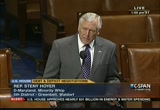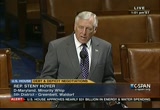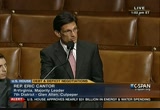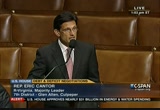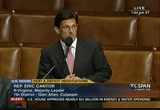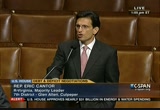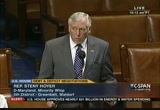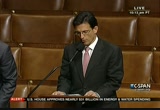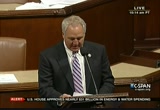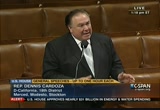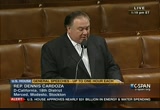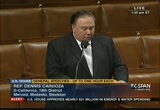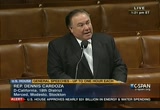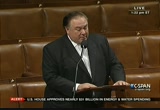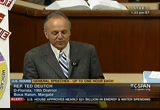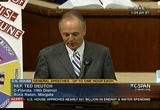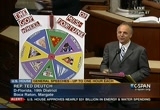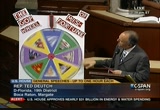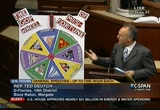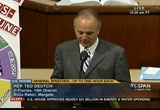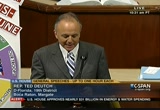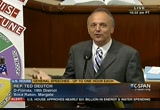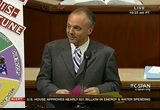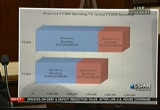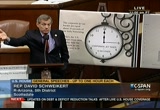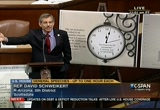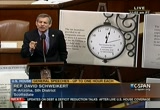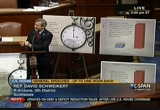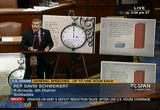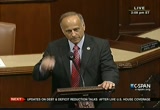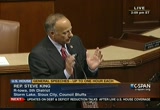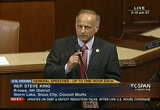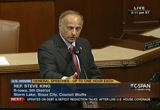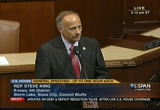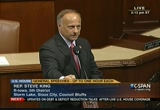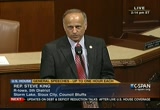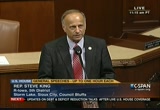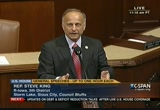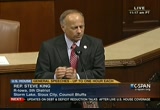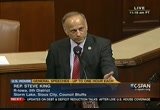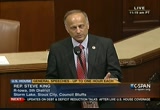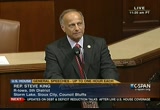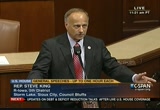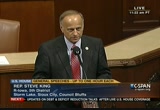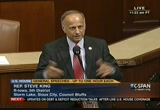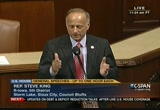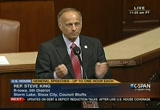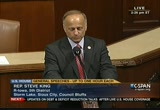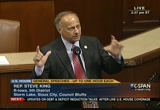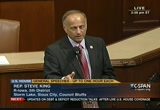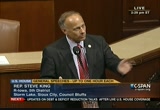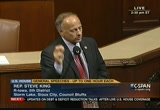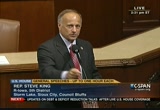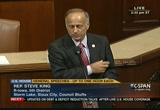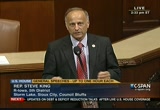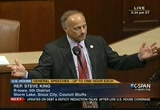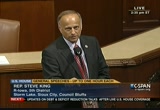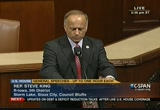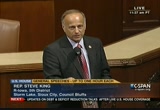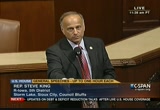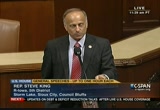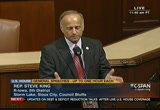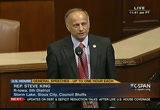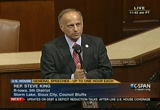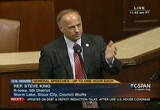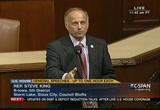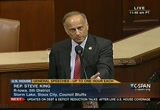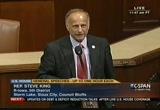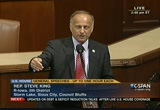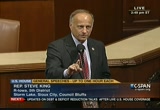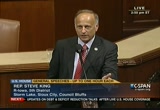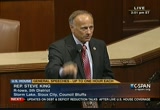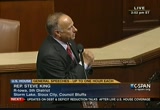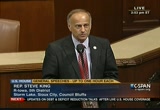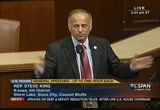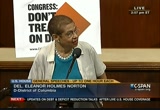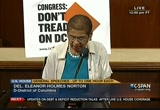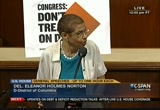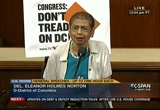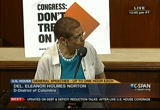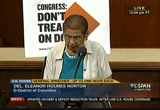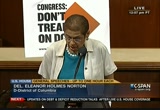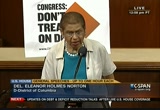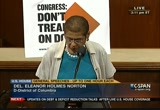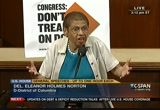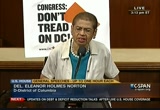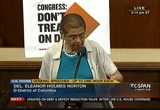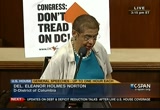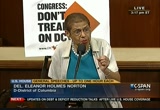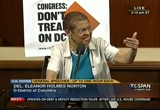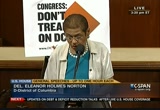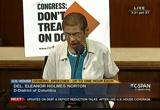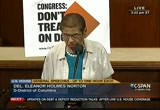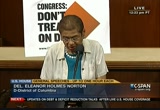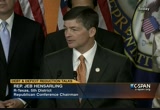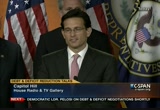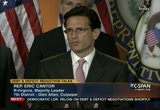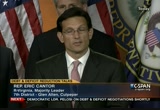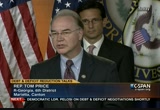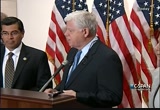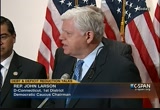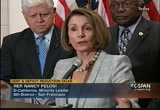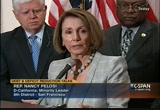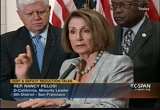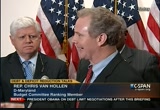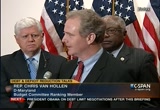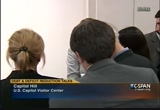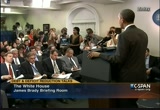tv U.S. House of Representatives CSPAN July 15, 2011 1:00pm-4:10pm EDT
1:00 pm
know there's sentiment from this side of the aisle, there is sentiment from your side of the aisle, and the president believes this as well, we have an opportunity, a critical time in our history when we have the makings of a bipartisan agreement, a bipartisan consensus that will move us in the direction that you and i know we have to more. and what is holding us up, as i understand it, is that your side believes that these 77% of independents, 74% of republicans are not correct, that revenues ought not to be part of this package. clearly we agree and have agreed that spending cuts need to be part of it. so i ask the gentleman, is there any possibility that these 74% of republicans are correct that in fact if we're going to have a successful package it will be because it
1:01 pm
is balanced? because my view is, i tell my friend, that if we do this it's going to really help create jobs. we have not done any jobs bills, we believe, in this congress. we believe any jobs bill you did so far was a patent bill. i know you are going to talk about all these bills you did, but we don't think that because you put jobs in the title it makes them a jobs bill. . the fact of the matter is if we can create confidence in the markets, if we could create confident deps that we can deal with our fiscal situation in a responsibility, bipartisan, collegial way, it will have an extraordinarily positive effect on every household in america. the confidence of america that we can work together in a bipartisan way and will stabilize the market and provide for our paying our bills and bringing our deficit and debt down. so i ask my friend, again, does
1:02 pm
he believe there is any possibility at this point in time that we can reach a balanced agreement on what is called a grand design along the lines of the bipartisan commission's recommendations? mr. cantor: does the gentleman yield? mr. hoyer: i certainly yield to my friend. mr. cantor: i thank the gentleman. mr. speaker, first of all i would say regarding the gentleman's discussion about what happened at the white house this week and my insistence that the president's at least statements in that meeting, because we don't know what the details were of his proposal and the so-called big deal, my insistence was consistent with our speaker's, that we not raise taxes. and that's why that construct doesn't work. we don't have the votes on this side of the aisle. i'm not supportive of raising
1:03 pm
taxes on people who are trying to make it right now and can't. so i would say to the gentleman when he refers to the other groups that have been out there, all of whom he say suggest that somehow we need to raise taxes, what the gentleman's talking about is how are we going to produce more revenues? we believe, mr. speaker, that you produce more revenues by having growth in our economy. we don't believe that you promote growth in the economy by cranking up the government spending machine by taking money from people who eastern it, washing it through washington's bureaucracy, and sending it back out. we don't believe that. we believe that growth is created through investment, through hard work in the private sector. by entrepreneurs, small business men and women, people who want to succeed but want to earn their success and are not waiting for government to grant it to them.
1:04 pm
so i say to the gentleman, if the aim is for us to create more revenues, one word in response, it's growth. i would say to the gentleman as far as his reference to the gallup poll and when he says that overwhelmingly people in this country want to have taxes raised as part of the so-called solution to our problem -- mr. hoyer: would the gentleman yield on that? mr. cantor: i would yield to the gentleman when i'm finished. yield back when i'm finished. to the gentleman's suggestion that that's where the american public is, i just disagree. i haven't talked to anybody right now when we got unemployment over 9% officially. when people are out of work and month after month can't find a job. when small businesspeople are having -- business people are having trouble keeping the lights on, i don't talk to anybody that says please raise my taxes. so that's what we should be
1:05 pm
focused on are the hardworking people, the people of this country, who want a job. who want to see this economy return to growth. they are the ones who understand that it's cutting taxes, it's cutting the overly burdensome regulatory system in this town that will bring back middle class jobs. and so to the gentleman's suggestion that somehow we have not been talking about jobs in this institution, i know it's not surprising to him that i disagree with that. mr. hoyer: it's not. mr. cantor: i say to the gentleman, week after week we brought bills to the floor, yes, that deal with our fiscal situation, that cut spending. because we've got to address that. just like people address it in their homes, their families, their businesses. but we brought numerous bills week after week to the floor that go to the root of the cause of uncertainty in the business community in this country and
1:06 pm
that is washington's overly aggressive and burdensome regulatory reach. we have got to get back to a growth posture, mr. speaker. and that means cut spending, lower taxes, and implement a balanced and sensible pro-growth regulatory system. as well as finally hopefully returning to a monetary policy that promotes a strong dollar. i yield back. mr. hoyer: i thank the gentleman for yielding back. first of all of course i didn't say, i don't think anybody wants their taxes raised, including me. i'd like to have all the prices for things i buy cut in half. 50% off sale. we all like that. i like going and using my credit card. so much easier. that's why credit cards encourage the economy. but you and i both know what happens when you use your credit card. at some point in time you get a
1:07 pm
bill. and the people who sold you the good or loaned you the money expect you to pay them. and i will tell my friend that i understand what he's saying. we have just come through arguably the worst recession that we have experienced since the great depression. and it was consistent with economic policies, which by the way started as you know in december, 2007, in which we lost eight million jobs. but the gentleman continues to say he wants policies which in 1991 and 1994 were argued were policies, we are going to grow our economy, expand jobs, and have those folks that you talk about do well. i ask the gentleman, he misrepresents our position. i want to make it very clear. we are not for asking people who
1:08 pm
are trying to make it in america , we are not for asking those who are struggling in america, we are not asking for those who rely on social security, we are not asking for those who rely on their medicare benefits to pay the burden of the spending that we have been involved in over the last decade which took us from $5.6 trillion of debt to over $10 trillion of debt. we are not asking for those struggling americans which the gentleman raises as the specter of those we think ought to pay their fair share. oh, no. we are asking for those who have done extraordinarily well over the last decade who have made millions per year over the last decade. some billions of dollars over the last decade. oil companies who are now making the biggest profits they ever
1:09 pm
made. and others to pay a little more so that we can stabilize the finances of america. so don't represent that it's democrats who are asking those struggling small business people we are not doing that. or those struggling working people in america who, by the way, have been stuck in the mud under the economic policies that were pursued consistent with the 2001 and 2003 economic programs. which has seen a growing disparate between working people and the wealthiest people in america. now, we can continue on that path and put on the backs of those struggling people you talk about, my friend, the responsibility to pay for things , or we can have a fair and balanced program. that's what the 74% in the gallup poll want. they don't want their taxes raised.
1:10 pm
what they want is a fair and balanced obligation. a fair and balanced participation in contribution. to paying the debts of this country. that we have incurred, we have incurred them together. you are not all responsible. we are not all responsible. our side of the aisle as you well know, this deficit was increased almost 90% under the bush economic policies. far less than that under the clinton economic policies. about half. but that's not the issue. both the debt went up, we are confronted with it, we got to pay it. you and i believe not paying it is not an option. the chamber of commerce says clearly that they urge all of us first it is critical the u.s. government not default in any way on its fiscal obligations. the president of the united states and our side has said, you bet. we don't want to do that. so let's ask all of us to come to the table and those who can't afford it ought not to be asked.
1:11 pm
but those who can, those who can should be asked to do so. not to penalize them but to say we are all in this together. and those who are best off in america, those corporations like the oil companies who are getting subsidies at this point in time, who said they didn't need subsidies if oil was over $55 per barrel, they testified in congress some years ago to that fact. it's been twice that and we are still giving them subsidies. all we are saying is that doesn't make sense. and we ought to have a balanced program. that's what those 74% and 77% of independents are saying. they are not saying they want their taxes raised. they are not saying we ought to raise taxes and incur more debt. they are saying we ought to pay our bills. they are saying we ought to have a fair participation by all americans in meeting this crisis that confronts us.
1:12 pm
i would hope that over the next three weeks that we could get to a place where we come together in a bipartisan way and ask all of us to participate. and those who can can help us confront this, bring this deficit down, balance our budget, and those who can't but who are working hard to make themselves and their families live a quality of life, we'll help them out. and i think as i said i'm going to stabilize the economy, grow jobs, and we'll have a better country. i would hope we could do that, mr. cantor. i'm looking forward to it. again i don't know that this cut cap and balance will get us there, and as i said we are not going to get there clearly under those provisions between now and august 2, and i think the gentleman knows that and i hope he has some other thoughts in
1:13 pm
mind, some other plan in mind obviously there have been a number of plans talked about at present in a speech about his plan. that was rejected. the gentleman says it wasn't specifically line by line. that's right because it was rejected before we got there. mr. boehner, your speaker, discussed trying to get a construct. so perhaps you have a plan that is above and beyond the cut, cap, and balance act that we might see that would be a balanced plan and that would help us. if the gentleman wants me to yield, i'll yield. no. i yield back the balance of my time. the speaker pro tempore: the gentleman yields back. mr. cantor: mr. speaker. the speaker pro tempore: the gentleman from virginia is recognized. mr. cantor: mr. speaker, i ask unanimous consent that when the house adjourns today it adjourn to meet on monday next when it shall convene at noon for morning hour debate and 2:00 p.m. for legislative business. the speaker pro tempore: without objection, so ordered.
1:14 pm
the chair will now entertain requests for one-minute speeches. for what purpose does the gentleman from illinois rise? >> i ask unanimous consent to address the house for one minute. revise and extend my remarks. the speaker pro tempore: the gentleman is recognized for one minute. mr. shimkus: thank you, mr. speaker. as we are talking about debts and deficits, financially, i'm here to talk about a freedom debt and freedom deficit that's occurring in parts around the world. one i have been focused on a lot is the country of belarus. the last dictatorship in europe. the political and economic and human rights situation in belarus has significantly deteriorated. a total of 33 opposition leaders and activists are still being held in prison for peacefully protesting against the dictatorial regime in 2010 presidential elections. slept protests have sprung up on an online campaign called
1:15 pm
revolution through social networks which encourages people to come to their locality, central squares, every wednesday to, press discontent with the lukashenko regime. journalists and ordinary people have and continue to be arrested. the authorities have also launched a distributed denial of service attack on opposition websites. the united states and the european union continue to condemn these activities. we must think strategicically about bela louis post lukashenko when the people are finally able to establish a democratic society based upon the principles of a premarket economy. in anticipation of that day, each and everyone should prepare now so as to be in a position to rapidly assist in the establishment of internationally recognized elections and rules-based transparent government in belarus. with that, mr. speaker, i yield back the balance of my time. . the speaker pro tempore: the gentleman yields back. for what purpose does the gentleman from georgia rise?
1:16 pm
>> i ask permission to address the house for one minute and to revise and extend. the speaker pro tempore: the gentleman is recognized for one minute. mr. johnson: mr. speaker, thanks to the courageous reporting for al-jazeera's english network, who risked their lives to find the truth, we have shocking evidence of war crimes committed by the sudanese armed forces against nuba civilians in sudan's south province. here in this photo a 2-year-old victim of an air strike. and here is a bomb crater in the middle of this village 50 feet wide, 15 feet deep. and here, mr. speaker chairman, satellite imagery analyzed by
1:17 pm
-- outside the capitol -- capital. as the u.s. person ell hides behind their barracks wall, the hunting of men, women and children on foot, in fighter jets and with bombs rolled out of back door of nuba villages. where do we stand? i yield the balance of my time. the speaker pro tempore: the gentleman yields back. the chair now lays before the house the following requests for leave of absence and such leaves without any objection being noted. the clerk: leave of be a requested for mr. burton of indiana for today. mr. coble of north carolina for today after noon. and mr. ellison of minnesota for today. the speaker pro tempore: without objection, those leaves are granted.
1:18 pm
under the speaker's announced policy of january 5, 2011, the gentleman from california, mr. cardoza, is now recognized for 60 minutes as the designee of the minority leader. the gentleman is recognized for 60 minutes. mr. cardoza: thank you, mr. speaker. i ask unanimous consent to revise and extend my remarks. the speaker pro tempore: so ordered. mr. cardoza: i want to thank my good friend for yielding this time to me. mr. speaker, i rise today to honor and remember a great american. ms. linda lopez, a treasured member of my staff who passed away over the fourth of july weekend. it's somewhat appropriate that that was the weekend that she passed away since she was such an honorable and patriotic lady. her services will be held today in our hometown that we shared. linda was not only a dedicated constituent services representative, she was a
1:19 pm
tireless advocate and community leader in merced, california. born in new mexico, linda moved to california's central valley in 1955 where she attended school in medera and then later attended stanford university. for the past 40 years she was part of civil rights and social justice work and was considered the most influential latina american in the central valley. linda's community leadership included serving on the city of merced's redevelopment agency gateway project citizens advisory committee, the city of merced's planning commission and several city of merced ad hoc committees. she also served on the san joaquin valley partnership telecommunications committee and the california state advisory board for transportation, planning and environmental justice.
1:20 pm
linda lopez was also an alumni of the great valley center's ideal inaugural class, hispanics organized for political equality and leadership merced. not surprising, giving her devotion to her -- given her devotion to her community, linda was named the 8--9-hispanic woman of the year by the hispanic -- 1998-1998 hispanic woman of the year by the hispanic chamber of congress. she served as a constituent services representative acting as my eyes and ears in the community. she worked on thousands of cases and helped thousands of people. she never let go of a case she believed needed work and was meritorious. linda prided herself on giving 100% to everyone who walked in the office regardless of their political party, the color of
1:21 pm
their skin, what they believed or didn't believe. she believed everybody deserved to be treated well. it was not unusual at all for linda to work late nights and on weekends to make home visits to elled leer constituents needing assistance or to follow-up with a phone call long after she'd done her best to resolve a case. the hallmark of linda's work was her unbelievable compassion and she was appreciated not just by the people she helped but by her community as a whole. linda's passion for making a difference set her apart from many others. she offered a kind smile and a compassionate ear to everyone she came in contact with. often, linda's relationship with other community members evolved into a mentorship program and as her legacy she ask that there be established a leadership scholarship in her name.
1:22 pm
linda guided many other aspiring community activists in her passion and her efforts to serve others. in addition to her role as a public servant, linda was a wife and a mother and her beautiful family will miss her dearly. linda lopez made merced, california, a better place to live, work and raise a family. mr. speaker, i am very proud today to call her a member of team cardoza and even more proud to call her a friend. mr. speaker, thank you for this opportunity to honor this great american, linda lopez, for her work, for her tireless efforts on behalf of our community and for her work on behalf of our country. i like to now yield to my good friend, the gentleman from florida, mr. deutch, for the
1:23 pm
remainder of my hour. the speaker pro tempore: the gentleman from florida is recognized for the remainder of the hour. mr. deutch: thank you, mr. speaker. mr. speaker, yesterday i was overcome with disbelief to hear my republican colleagues, the same colleagues who are leading america headfirst into its first default of its obligations, call on president obama to start picking and choosing who wins when we run out of money. now, pay our seniors first, mr. president. when we force a default, pay our bond holders first, mr. president. pay our soldiers first, mr. president. the g.o.p. is shockingly silent, however.
1:24 pm
remarkably quiet when it comes to naming who the treasury should stop paying when they force us into default. now, in case you weren't aware, let me clue you in on the definition of a default. it means the inability, the afford, thanks to the possibility of this default that our friends on the other side of the aisle are leading us toward. this is a crisis that they manufactured. two wars unpaid for, tax cuts for millionaires that were unpaid for, policies that ignited a fiscal crisis and sunk us into a sea of red ink. now, their refusal to accept responsibility for this debt that they created means that someone who the treasury owes money to will not get paid. someone will not get paid.
1:25 pm
and the full faith of the united states will be broken. now, they're paying a game with our economy to force through an extremist agenda. that's what we've been battling against. that's what you've been watching. that's what people all around the country are so incredibly frustrated with. it's a game that i have right beside me. it is in fact the g.o.p. wheel of misfortune except in this game there are no winners. there are only losers, but why don't we give it a spin? as we approach the default and we spin the wheel, the first one that comes up i see is two million federal workers. come august 2 the g.o.p. defaults, forces the treasury to send every federal employee
1:26 pm
home without a paycheck. for the personal care attendant who works for the department of veterans affairs to the park rangers who leads our families through national parks, a g.o.p. default will send two million american workers home without pay. during this time upon appointment our economy will suffer even more with the ripple effect that suspending pay for two million american workers and their families. so pay the federal workers, we might be told. let's figure out who else we might choose not to pay. what other obligations of the federal government will be broken? what will we choose to avoid if there's a default? well, we go back to the wheel, we spin the wheel again, we see foreign creditors. come august 2, the g.o.p. forced default -- will force the treasury to start paying interest to our foreign creditors who currently buy
1:27 pm
u.s. credit with total confidence. when you default on a credit card, everyone knows this, when you default on a credit card, you don't save money. your interest rates go up. the bank lowers your credit rating. and if the u.s. stops paying its creditors, then the u.s. credit will be downgraded, interest rates will skyrocket and our economy will freeze and the damage will amount to a tax increase on every american family. it will be thanks to the republican majority that will force this default. but perhaps we should pay the creditholders. maybe that's who we should pay. clearly there's someone else we will not, then, so let's go back to the wheel. when we spin the wheel this time we get to bondholders. well, come august 2, again,
1:28 pm
someone won't get paid. the g.o.p. default will force the treasury to deny u.s. bondholders the money that they entrusted to our nation. the college student cashing in a bond their parents bought on their first birthday, the retirees, the retirees who steer their 401-k's to the most secure, safest investments in the world, at least until the republican majority forced a default. but perhaps we'll pay the bondholders. we've been told we can pick and choose who we're going to pay when there is a default. then, we should find out perhaps who we might see next. if you spin the wheel again it might turn out that we come up on medicare. now, on august 2, again, the g.o.p. default will force the
1:29 pm
treasury to stop paying for the trusted medicare benefits that 54 million seniors rely upon. perhaps my friends on the other side of the aisle may finally have their opportunity to dismantle the system that keeps so many retirees from bankruptcy due to private insurance bills. the doctors who treat our medicare patients for the primary care physician who takes seniors' blood pressure during yearly oncologists who treat our grand mothers and grandfathers who struggle with cancer won't get paid as a result of this default. but, again, we've been told we can simply pick and choose, that perhaps it's important for us to make sure that medicare benefits are paid. what to do? we can go back to the wheel. we can spin the wheel again. it may turn up on veterans. perhaps we've made a decision to make these other payments,
1:30 pm
but it comes up on veterans. so, again, on august 2 if we do not come to an agreement, which is completely doable if we do not avoid this g.o.p.-caused default, then the treasury may stop caring for our veterans. . representing florida's 19th district, i'm privileged to serve thousands of veterans. many of them veterans of world war ii. members of our greatest generation, the very people who built this nation into what it is today. now, americans believe that we have to honor the sacrifices of those who served. but by forcing america into default, the g.o.p. will deny care to the men and women who embody patriotism and deserve every benefit that they earned while serving this country. this game, this unfortunate game that they wish to play could go on and on and on.
1:31 pm
maybe we choose to pay our veterans or we stop paying our troops. maybe we will as the president pointed out, we will have no choice but to stop paying social security in the event of default. come august 2 the potential of the g.o.p. default would force the treasury to deny seniors the social security benefits that they earned over a lifetime. in my district and around the country, going without social security for any period of time will mean destitution and extreme financial hardp chp. -- hardship. the republicans have long fed the american people the lie that the bonds held by social security are junk. well, they've never been junk. at least so long as america has never defaulted on its
1:32 pm
obligations. this is the wheel of misfortune that we have to avoid getting to. it's not a game anyone wants to play. this hardship thrust upon the american people in the event of a default is completely avoidable. the g.o.p. could make history, make history by working with president obama to reduce the deficit in a meaningful, in a responsible, and in a fair way. instead, republicans seem hell bent on making history by tarnishing the full faith and credit of the united states of america for the very first time. the reason they won't come to the table? the reason that we may be forced to spin the wheel of misfortune? preserving tax cuts for millionaires? -- preserving tax cuts for
1:33 pm
millionaires. proifing tax breaks for corporate jets. preserving tax loopholes and payments to oil companies. they seem more intent on subjecting the american people to the wheel of misfortune than standing up to the special interests that americans want us to stand up to in the name of fiscal responsibility and fairness. in this game of partisan politics, the game that people all around the country are tiring off, no one wins, and the american people, unfortunately, always lose out. thank you, mr. speaker. i would be delighted to yield to the gentlelady from texas, ms. jackson lee. the speaker pro tempore: the gentlelady texas is recognized for the remainder of the hour. ms. jackson lee: let me thank the gentleman from florida. let me thank the gentleman from
1:34 pm
florida, he has certainly awakened a number of issues and members on his important discussion. i wanted to join in his commentary about this very important discussion. mr. speaker, we will be leaving shortly and i'm glad that we will be returning on monday for very serious business. many of us have been in meetings today engaging on solutions rather than distractions as relates to the business of the american people. none of us have experienced, i believe, the attention to an issue of the budget as much as we had that attention now from our constituents on will the debt ceiling be raised.
1:35 pm
there's not a time in these past couple weeks that i have gone home when businesspersons, students, seniors, working families have not asked the question, will we get it done? i'm an optimist and i said to them, yes. i expect that. in fact, i have already gotten it done. i voted on the clean debt ceiling raise or lift so many weeks ago, that was the right thing to do. and the reason is because over the last couple of decades we have had 60-plus increases in the debt ceiling. starting from ronald reagan, including bush one and bush two, president clinton, president carter. it's interesting that for some
1:36 pm
reason the tension in this discussion has really gone beyond understanding. let me be very clear. i am looking forward, we have had such an intense couple of months, that we have not had the opportunity, really, to engage as members of congress, our committees have been fairly tense and rapid, our schedules have been such that we have been here one week and gone the next, and i know that there are new members of the 87 members of the republican conference that i would have some things to agree with. and i would appreciate having that opportunity. but this is a time now without the opportunity to get to know
1:37 pm
all of the members of the republican conference who are new that we have to get to know each other around solving america's problem. as i indicated when a clean debt ceiling was put on the floor of the house, many democrats voted for it. the bipartisan simpson-bowles committee, democrats and republicans, were on that committee. at one point in the discussion with president obama, the leadership of the republican house agreed to do the larger package of $4 trillion as relates to the debt ceiling, revenues and cuts. makes sense, doesn't it? that's what a household does. they look at where they can bring down their budget, but they also say now, what can we do to increase that revenue? people who are unemployed want to increase revenue by getting a job.
1:38 pm
and so i don't fully comprehend why it is such a complicated process to participate in. what makes it difficult is we have leadership in the other body that is republican that says their main job is to defeat president obama in 2012. i didn't hear that discussion during my fellow texan's tenure as president, george bush. from democrats. there were policies we disagreed with, including the iraq war. but there was no concentrated continuous effort and statement, my main job here is to bring down president bush. that was not the language that we used. so how do we get the leader of the minority in the senate suggesting his main job is to bring down the president of the united states? that's what mr. and mrs. jones, mom and pop all over america don't understand. they don't understand this.
1:39 pm
because we all take a pledge of oath. we all have the same constitution in our hands. and we know that this body of lawmakers is looked upon as the most powerful lawmaking body in the world. we don't walk around with a lot of big shoulders, but that is how we are perceived. i happen to have been at the european union discussing the conditions in greece and portugal. they are far different from that of the united states. first of all, the economists will tell us this country is not broke. it has the ability to fix itself. let us not cast out despair and desperation and frustration to the american people. we are americans. not arrogant, but we are patriots. we can get this done. why is there such a devastating attitude from our friends on the other side of the aisle? it is the end of the world, the death knell. so those people who are looking forward to job creation and jobs are listening to this rancor,
1:40 pm
this discourse, and telling -- saying to themselves, there is no hope. there is no hope. and i disagree with that. there has to be hope for the children of this country. there has to be hope for the young men and women on the frontlines of iraq and afghanistan and places around the world. there has to be hope. the reason why i know there is hope is because my own industry, the energy industry, just created a program for veterans who jobs through the energy industry. i'm asking them to create one for 18 to 35-year-olds. businesses are still alive and well. the financial services, the banking entity must be involved in providing access to credit for our smaller businesses who are creating jobs. we are alive and well. and so i believe what we should do is to go forward with a package that is reasonable. that lifts the debt ceiling as we did for everyone else. i would vote for a clean debt
1:41 pm
ceiling. lift it up. then begin to with great common sense plan our budget and our cuts. mark zahny -- zandi has said that. an economist who worked for a number of republicans, such as john mccain, former presidential candidate. why are we trying to reinvent the wheel? all economists will say, you don't make immediate cuts in this fiscal year, you project them out. just like budget and household. they move out. they do what they are going to do for the month of june. then for the month of july, and then for the month of august. but, no, i am particularly sensitive to the fact that only this president, only this one, only this one has received the find of attacks and disagreements and inability to work. only this one.
1:42 pm
read between the lines. what is different about this president that should put him in a position that he should not receive the same kind of respectful treatment of when it is necessary to raise the debt limit in order to pay our bills, something required by both statutes and the 14th amendment, why isn't it addressed in the manner? it's all right to disagree or agree on the balanced budget amendment. it's all right to talk about how we are going to appropriate. in fact, in this house the republicans are getting their way. gutting and cutting everything that we can find. it's all right to have that disagreement. that is the give and take of democracy. when you win, you are the majority, and if we can't find a way to agree together, then the majority wins. i understand that. but i do not understand what i think is the maligning and maliciousness of this president, why is he different? in my community that is the
1:43 pm
question we raise. in the minority community that is a question being raised. why is this president being treated so disrespectfully? why has the debt limit been raised 60 times? why does the leader of the senate continually talk about his job is to bring the president down to make sure he's un-elected. it's 2011, not 2012. you need to play those politics in 2012, not now. so we can move forward. you may disagree with me, i believe it's important to preserve medicare, medicaid, and social security. lifelines for our community. and many of us believe that that will not dash the hopes and dreams of americans to make sure seniors, and disabled, and those who are retired and those who need these resources, children who need medicaid, it's not unseemly to protect them in the course of our discussion on budget cuts. it's not unseemly to protect military families. it's not unseemly to be able to
1:44 pm
provide increase in salaries for the young, if you will, enlisted man or woman in some occasions have been on food stamps. so i'm prepared to do the hard thing that we have done in 1997 when we had a budget resolution crafted by a divided government, if you will. and we produced the children's health insurance program and a balanced budget. without a balanced budget amendment. and there were some fixes that we are still living with such as the physician reimbursement that came about. as what happens when you do that, something has to be fixed. we are still something with the physician reimbursement which came about through the 1997 balanced budget. so balancing the budget and the balanced budget amendment it's not all peaches and cream. it can truly be destructive. but i am willing in the long range with common sense coming
1:45 pm
from texas to look seriously at how we can work together for cuts but revenue enhancers. i just had a meeting with industry representatives this morning that one of the industries that happens to be in the eye of the storm and there was a consensus saying, we are prepared to look broadly at tax reform, we'd like to give our ideas. i said, you deserve to give your ideas. as you deserve to let everyone know that we are in the business of creating jobs. . but we can't do this in the hostility -- background of the hostility around the treatment of president barack obama. so what are we prepared to support? i believe, again, that we can come together around of a reasoned response and that reasoned response, again, our
1:46 pm
revenues and cuts, and i believe we can move this before august 2. we only have to be able to convince the new members and the leadership, the point man for the republicans that it is better to stand as a whole nation than to bring us down. there are those who believe this is what will happen before august 2. and frankly, it is a challenge. we've already lost $150 billion. right now our colleagues need to know that. by all of this fooling around we're losing in the markets $150 billion to $200 billion. you want to know where the unemployment came from, we've been creating jobs in the private sector but it's our states that have been laying off hundreds of hundreds of thousands upon thousands of
1:47 pm
public workers, firefighters, police, sanitation, teachers that we'll never get back for our children when they enter the fall classes, 34, 40, 50 may be in a class. what kind of america is this? what kind of an america would lay off the public sector employees which were the opportunities that opened to minority, a large number of public sector employees, you are literally killing our community with the high number of unemployment. we are at double digit in the african-american community. i frankly believe as an american i should look out for all interests, and that's why i believe we should top the tom foleyy and look out for all americans. yes, i have to make sacrifices. we laid out our parameters. mine, medicare, medicaid and social security. but what can we do together and
1:48 pm
what can we do where the pain is distributed and what can we do with the respect given to everyone, speaker, majority leader, minority leader, whip, leadership in the other body, how can we come as those entities they respect the body they represent and we as members of congress represent our constituents in that respectful manner and most of all respect the office of presidency and as well to respect this president, president barack obama? i hope someone will say that what it appears to be is not in fact accurate but historically it seems to be nothing more. i simply close in accounting for that attitude is the very
1:49 pm
visible debate on in my memory of the affordable care act, and i have never seen the level of depicting of the president of the united states by americans as i had seen during that debate. never seen it. i did not adhere to the burning in effigy of any president than the iraq war. at that point it was president bush. the shoe throwing. i spoke vigorously against that. you did not disrespect our president. you disagree or you agree but not in the way i have seen. i simply close this afternoon by saying it gives me a great sense of affection, i'd say
1:50 pm
pride, for lack of a better word, in what this country stands for. i believe that america can solve any problem that she puts her mind to. the tumultuous 1960's is part of my history. a segregated america is part of my history. and during that time one felt, could we ever come through this, the bloodshed, the hangings, the brutality? but isn't it wonderful that a man by the name of martin king along with others rose, too many to name, and carried the mantle of peace, the drum major for peace and he came through all the contentiousness and all of the conflict and raised his voice and said america can do better. and a president who i am so
1:51 pm
proud of, linda baines johnson, used his political astuteness and crossed very difficult -- lyndon baines johnson, used his political astuteness and crossed those very difficult lines, those in congress who couldn't support any manner of civil rights legislation, isn't that a miracle what we thought we could not do? and that president, who i owe such a great debt of attitude, that master of the political process, lyndon baines johnson, the creator of the great society of which many of us now benefit from, pell grants and medicare and housing, that person we call the president at that time, orchestrated groups that possibly would never speak to each other and voted to change and move america forward. and so i ask the question -- what makes president obama different?
1:52 pm
i cannot imagine coming this far in my life, that of my children's life and that of others to come to a point where we would use the uniqueness and the difference of this president to treat him differently. if that is not getting our way, then there's no reason why we can't come together and solve this problem. as some would say, this is not rocket science. it is voting for the right approach, and that approach is revenue and cuts. i will go home to my district and engage with anyone who desires to engage in these discussions. we see each other as we walk about and go about our duties and give them the sense of optimism that i have. as i do that i will be in a meeting discussing why the
1:53 pm
independent school districts, one of the last remaining districts with a 70%-plus african-american school district, has been closed by governor perry and the agency. why? 7,000 students and parents now looking as to what is their next step. why is it closed? is it because you underfunded them and didn't provide them with the resources? is it because we have no interest and getting our hands into the mix and trying to help bring up the scores with teachers and salaries that can meet the needs of students who are in a property poor area? i'll go home and deal with that. in the course of dealing with that i'll talk to those parents about hope, about the greatness of this nation and about the fact that we're going to do our job. and as well, i'll talk to them about the sense of pride and
1:54 pm
respect we have for the president that this nation elected, has come out of a history that i am very well aware of. we would hope that the same respect that was given to the first irish catholic president, same respect and interest that has been given to any president that brings to bear a unique and valuable perspective would be given to president of the united states, the american president, our president. he is no different than any other president that has served, and i beg this house and i beg this congress to treat him with the dignity that the office deserves. get on with our work. get on with solving the problems of the american people, a diversely, multicultural nation. i am proud of that. god bless this congress. god bless this president.
1:55 pm
god bless the united states of america. we can do this job. i yield back. the speaker pro tempore: the gentleman yields back. under the speaker's announced policy of january 5, 2011, the gentleman from arizona, mr. schweikert, is recognized for 60 minutes as the designee of the majority leader. the gentleman is recognized for 60 minutes. mr. schweikert: thank you, mr.
1:56 pm
speaker. one of the reasons i'm here today is -- have you ever had one of those moments where you've been watching some television, you've been hearing some of your friends here on the floor and the level of frustration starts to boil over and you decide, look, i either need to get up behind that microphone and do a series of explanations of why i'm bouncing off the walls frustrated and think about what we heard just today? we had one member come down here and meaning well and trying to find some way to tell his story but treating the u.s. sovereign debt issue as a gain. i heard the president today in a press conference once again throw out items like, well, those corporate jets. well, we need to tax the rich more. and here's the problem. the math just doesn't work. i have these boards in the office that i use for a lot of other speeches. it's time to bring them here to the floor and walk through, and
1:57 pm
i'm -- i am going to do this fairly quickly because i know i have some other friends of our conference that want to speak but, first, let's do the big picture. this is our world today. this is a dollar bill. today every dollar this federal government spends, 42 pennies of it are borrowed. get that through your head. every time we send out a check, every time we pay a vendor, that dollar that we pay that vendor, 42 pennies of it had to be borrowed. once you understand that, a lot of the other rhetoric you hear around here is just bizarre. if not bordering on silly. so let's bounce on to the next -- let's bounce on to this next board. this will help understand how fast, how fast our numbers are eroding and why we need to do it now. this is not the day.
1:58 pm
we come to the floor next week and vote for something, let's raise the debt ceiling and we'll have an honest discussion next month about the scale of the debt. we'll have an honest discussion some other day about what we're going to cut. you got to understand every -- what is it $7.2 sects -- 7.2 seconds someone turns 65. this body has the moral responsibility to set aside, the baby boomers are gone. the best example i can give you is, how many of you have heard always from the politicians, oh, don't worry, social security is just fine? but didn't we hear the president say, if we don't raise the debt ceiling there might be a problem? what is it, is social security just fine or is it living on borrowed money? you can't have it both ways. finally, i think the american people are waking up and understanding the scale of this
1:59 pm
debt and the crisis it brings us. so let's have a little interest here. here we are in 2010. here's where we are in four budget years from now, 2016. do you see this blue line? this is mandatory spending. it continues to grow and grow and grow. i'm told in about 1/2 years this -- 13 1/2 years this blue line consumes every dime of federal spending. we are consumed by the mandatory spending, the entitlements consume everything we are as a people. but here's one of the things. if i look at even last year and this year, we don't take in enough revenue today to cover just the mandatory spending. so when you think about what we call discretionary, discretionary, military, e.p.a., all the other alphabet agencies, all those exist on borrowed money. this is our world today. so we've been -- i've been struggling and struggling trying to find a way to say, how do you help people
2:00 pm
understand the scale of these numbers? and then we came up with this idea, we'll make a clock. everyone knows how to read their clock. i hope. of course, the problem is, as one of my staffers pointed out, all the kids today are wearing digital watches. we are going to try it this way. how many of you have heard the president over and over and over saying those corporate jet owners need to step up and start participating more. fine, let's say we agree with that. how much does that buy us? think about this. we borrow $had.7 billion -- $4.7 billion every single day. this whole discussion over here where people -- we heard it just an hour ago from the leadership in the minority saying, oh, corporate jets, you got to be willing to give up those. let's say we do. what cost it really buy us? you'll be happy to know that we did the calculation to make it easy.
2:01 pm
it will buy you 15 seconds. 15 seconds of borrowing a day. ok. go through this with me. 1,440 minutes in a day. 24 hours. and we are having discussions about things that are 15 seconds . this is absurd. so let's actually go on to some of the other really brilliant suggestions that seem to be coming out here. how many of you remember about six weeks ago the majority in the u.s. senate held literally hearing after hearing about those subsidies to big oil. if we get rid of these, they'll actually do something. we even heard it again an hour ago over here from the left saying if we get rid of those subsidies, that's our first step into balancing this budget. let's do the math. but let's do it my way. we wipe out the depletion
2:02 pm
allowance and all these subsidies for not just big oil but all oil t equals $2.4 billion billion a year. and just for a reference standpoint, i thought it would be fair for everyone to understand, those $2.44 billion we call subsidies to big oil, there's $8.72 billion that goes to green energy. so understand the scale here. let's just right now we are only going to fix aid on fossil fuels, what does that buy us? those people that like charts, but those folks that like a clock. it buys you $2.2 minutes. you see our hand here? this whole discussion and they act like it really does something. so we had the corporate jets at 15 seconds. this whole discussion about big oil and take away those subdies, it buys you $2.2 minutes of borrowing a day. think of that. this is what around here holds up an honest debate?
2:03 pm
this is the honest proposals this government is throwing up and letting the american people think we are talking about saying, if we raise the debt ceiling we'll go after these things and get rid of those corporate jet subsidies and big oil. yes, we'll almost have gotten almost three minutes of borrowing covered a day. it's absurd. so let's actually bounce on to one of the other bits of discussion that bounce around here. how many of you, we actually just heard it a while ago. those tax cuts. do you remember those bush tax cut extensions which are now the obama bush tax cut extenses because the president signed them back in december under the lame duck session? we remember that. we hear the discussion, we need to take those tax cuts away from those millionaires and billionaires. that will balance this budget. does anyone out there pull out their calculator and do math? i thought why don't we make a clock out of it. we'll make a slide out of it so we understand reality.
2:04 pm
if you remove the tax cut extensions for everyone, not just the millionaires and billionaires, let's do everyone, because math is easier to do that way, it buys you a whopping 28 minutes of borrowing a day. think of that. i have watched people walk up to the well of this house stair into this audience, this august body, and act like it would solve the problem. how can this place be operating under math fantasy? 28 minutes. if you wipe out -- that's playing the assumption it doesn't slow down the economy, doesn't raise unemployment, and every dime comes in. but if we are willing to engage in that fantasy, why not? they are arguing its fantasy. it takes care of 28 minutes of borrowing. so far we have covered 15 seconds with the corporate jets, and 2.2 minutes with going after all fossil fuels. now we found another 28 minutes. 28 minutes.
2:05 pm
of borrowing can be covered if we wiped out what we called the bush tax extensions that are really important to economic growth. we'll just give it and just also pretend every dime comes in. are you starting to realize we are barely at a half-hour of borrowing a day and these are the types of proposals we are getting from the left? on what we should do you start to realize, where is this basis in reality? let's go for a big one. let's actually hop on because i'm not a big fan of war. so i thought, hey, why don't we calculate the big can hewna. what would happen kahuna. what would happen if we took in all the money from the corporate jet subsidies and all that money from getting rid of anything that incentivizes fossil fuel expiration, and we also get rid of those bush tax cuts extensions and we are willing to
2:06 pm
slow down the economy and assume every dime comes in, and we just didn't have any of the wars. we didn't have libya, we didn't have afghanistan, we didn't have iraq, they just all magically went away tomorrow. because we have had repeatedly members from the left stand up behind me these microphones and tell us this would take care of the problem. we just wouldn't have that $1.6 trillion we are going to run in debt this year if we just didn't have these sorts of things. once again it's time to put batteries in the calculator. if we pretend every dime of that all went straight to paying down the debt, it's three hours. it's three hours. and we have actually put these slides up on our website so people can actually download them and look at them. but i want to turn to my brothers and sisters on the left here and say, ok. if i assume everything you're saying equals three hours, do
2:07 pm
you have any honest solutions for the other 21 hours a day? instead of some of the silly rhetoric that i hear a president walking up to microphones and throwing things out and acting like this is my solution to the american people? the american people need to understand the scale of this debt. and it is going to destroy us as a people. and for once you are saying your congress, at least on our side, stand up, be tough enough and say we are going to use this opportunity to save our kids and our grandkids and we are going to save this republic. please, please learn the numbers. understand how devastating this is. and it's time for the fantasy, the fantasy to come to an end and start dealing with receipt mal-- real math. mr. speaker, i yield back the balance of my time. the speaker pro tempore: the gentleman yields back the balance of his time. the house will stand at ease.
2:08 pm
the gentleman from iowa will control the remainder of the hour. the gentleman is recognized for the balance of the hour. mr. king: thank you, mr. speaker. mr. speaker, it's my privilege to be recognized here on the floor of the house of representatives and be able to address you on the -- about the matters of the day and the important issues that are before us here in this congress and in this nation. and i'm continually impressed by the quality of the young people that are attracted to this city both as visitors, vacationers, but also from people that will get their college degree or degrees, and many of them with a 4.0 grade point average, active in all kinds of extra activities, the stellar cream of the american crop are magnetized to come to the city. i'm impressed with them their intelligence, patriotism, dedication on both sides of the aisle. but i want to add something that
2:09 pm
is a perspective that i think those of us that have been around this planet a little longer have to offer, that is first that some of us have lived a lot of history that others had to learn by reading the history book. we know how the history books have been truncated. and there's not time to learn all the things that happened in history. so we learned a lot of history from the front page, from the radio, the television, from the news, and being in the middle of that history and that all is part of the collective memory of this house of representatives and the senate on the other side, some will say they probably remember more history in the senate than woo do -- we do here in the house. my point is this, you can have very smart people with very good principles and the experience are supportive of them understanding the underpinnings of the greatness of this country, understanding the american exceptionalism, but sometimes the definitions and as
2:10 pm
it's presented is taken at face value because they might not have had the years to see things go wrong when good ideas come before this congress. and i look back and think of the time in 1995, actually 1994 when republicans took over the majority in the house of representatives here after 40 years of wandering in the wilderness of being in the minority and not being able to advance legislation, there were many here in the -- on the republican side of the aisle that were complacent with that, mr. speaker. that accept accepted the idea that -- accepted the idea the majority would never change in their lifetime and they operated within the zone delivered to them and they didn't go and charge the ramparts or the windmills, so to speak, because the ramparts to them were windmills. yet there were others that were revolutionaries. saw the vision. realized america was going in the wrong direction. and they built a coalition here in the house of representatives that i watched on c-span night after night after night, step down here on this floor at this
2:11 pm
very spot, mr. speaker, and make arguments to the american people, make arguments to me that moved me. moved me in my head and moved me in my heart and helped me understand that it wasn't me alone that was seeing that america was going the wrong direction. that we were overspending and we had this massive welfare system and that we were expanding the dependency class in america. this spirited people we are, this unique people we are here in america were being diminished, were being diminished by the growth of the nanny state and growth of the dependency class in america. so in 1994 the inspiration came from many people that were hearing the inspiring words that were spoken into this very microphone, mr. speaker, but also across the country on talk radio, across the backyard fence, over a cup of coffee, at work, at church, at school, at
2:12 pm
play, sat recreation. in fishing boats and golf carts across america, we had a national conversation about where america needed to go. and the result of that consensus of the national conversation was a massive change in the seats here in the house of representatives and a new majority in the house of representatives that came sweeping in in november of 1994. and there were big changes. and the freshman class that came in and sworn in here on this floor in january of 1995 were revolutionaries. and they brought a difference. and they forced a balanced budget here in the house that was not expected to ever be reached. they forced -- they cut spending until they forced a balanced budget. and they reduced welfare and put more people in a position where they could earn their dignity and a paycheck. at the same time. now, as this unfolded they brought forth as they said they would in the contract with
2:13 pm
america that they would vote on a constitutional amendment to produce a balanced budget. that was the 1994 promise that was fulfilled in 1995. a vote on a balanced budget amendment here in the house of representatives that passed the house of representatives, was messaged right directly down the hallway to the united states senate, mr. speaker, where the senate took up the vote for the constitutional amendment to balance the budget and it failed in the senate in 1995 by a single vote. how different, how different might it have been, mr. speaker, if one more senate sneet had gone the other way, if one more united states senate race had resulted in a victory for someone who believed in a balanced budget amendment, believed in the constitution itself, fiscal responsibility, those american exceptionalism principles i have briefly mentioned, but believed in
2:14 pm
requiring a balanced budget actually. how different it might have been. if the senate had voted with the 2/3 majority as the house did in 1995, and had sent a constitutional amendment to require a balanced budget to the states, the 50 states for ratification, now we know, mr. speaker, it takes 3/4 of the states to ratify an amendment to the constitution before it becomes an and incorporated into our constitution. we'll never know how many states would have ratified that amendment because they didn't get the chance to do so. had that been messaged to the states in 1995, we can only ask the question, would the states have ratified a balanced budget amendment? i think so. i believe 3/4 of the states at a minimum would have done so, and if they did not, i think it would have changed the politics within enough of the states so that they would have. imagine, if this congress here and how today, this week, this month, would pass a balanced
2:15 pm
budget amendment to the united states constitution, out of this house with a better than 2/3 majority, equal or better than, to the senate where they need 67 votes in the senate, if that constitutional amendment to require a balanced budget gets messaged to the states, some will say look at the makeup of the state legislatures. there aren't enough, put it this way, mr. speaker, enough republican majorities to pass and ratified a constitutional amendment to require a balanced budget. . maybe not and not by anly thecal judgment of this moment, mr. speaker, but -- an analytical judgment of this moment, mr. speaker, but think of what happens in my neighboring state of illinois where democrats control the politics and they insist on deficit spending and running themselves into the red. it seems as though the rite of passage in illinois is if you're elected governor you go off to prison. but if we have a balanced budget amendment sitting on the docket
2:16 pm
of the illinois state legislature, today i don't think there's much of any chance that they would ratify it -- an amendment to the u.s. constitution to do such a thing. but i do think, mr. speaker, that there will be hundreds of people all across illinois that will decide they want to step up and run for public office so that they can have the chance to vote to ratify a balanced budget to the united states constitution in the state legislature. they would knock doors and talk to their friends and neighbors and say, i don't care if you're a democrat, i don't care if you have some other interest, the best interest you can have is the long-term best interest of the united states of america. and it's become increasingly clear that the long-term best interest of the united states of america is to require that the budget be balanced by constitution because this congress has not demonstrated and the president clearly has not demonstrated that they have enough discipline to crank this spending down to balance the
2:17 pm
budget. part of the reason is we have elections every two years in the house and every six years in the senate. and so the incentive is be in a position to keep your job in two years or six years. there's not an incentive out there that tells the members of the house, the senate that we should prepare the groundwork for our grandchildren let alone children yet to be born. that's part of the dynamic. the other part of the dynamic are that this capital is full of -- capitol is full of bright, energetic people, a lot of them come to my office on a regular basis, a lot of them are honorable people with good intentions but a lot of them are there because they want the tax dollars of the american people to go to their interest. and because there's a constant drum beat of asks for more and more and more spending and the push for, well, i know that you're fiscally responsible and you want to battle -- balance the budget but could you make this exception because it's so important, it's so important that issue after issue, you
2:18 pm
could be accused of voting against children and women and seniors and minorities and handicapped and combat-wounded veterans, altogether if we do anything other than increase the budget to the level that's hoped for and predicted by the president of the united states. so when i stand up for fiscal responsibility, mr. speaker, i often get this statement which is, well, you're a republican, you republicans spent too much money and you have to admit that you're half the problem. well, no, i don't, mr. speaker. first, i voted against a lot of that spending. i've been an original co-sponsor of the balanced budget amendment offered by congressman bob goodlatte of virginia since i arrived in this house. and i'm sticking with him and the principles that are that constitutional amendment that we passed out of the judiciaryary committee that hangs on the calendar of the house today. but aside from that, speaking
2:19 pm
from a party by party standpoint , the truth is this. yes, republicans spent too much money and in the middle of the iraq war we came within $160 billion of balancing the budget. now, that's not particularly impressive if you dial it back a generation or two or three, but it's very impressive when you think of it in terms of the president's budget which is a $1.65 trillion deficit. in a single year. so actual real numbers come down to, we came within $160 billion of balancing the budget in the -- at the height of the iraq war and had it not been for the iraq war we would have balanced the budget. if the equation is there, it's that simple. but the president has proposed a deficit, annual deficit spending budget of $1.65 trillion. now, i've said the deficit of
2:20 pm
republicans was $160 billion, the president's deficit is $1.65 trillion and on his deficit, mr. speaker, i'm not saying that this is a 10-year accumulated deficit. this is one year, one year, $1.65 trillion. now, yes, republicans spent too much money. but for every dollar that they went into deficit, the president proposes $10 of deficit spending into the same equation. i can't see that that's a shared responsibility. it looks to me like it's 10 times the overspending on the part of the president versus 1/10 of that on the part of the republican congress here in the middle of the iraq war. those are the facts as they are established by the congressional budget office. we need to stand on facts here, not on emotions. and we need a level now of fiscal austerity. mr. speaker, we need to get to this point where we can send another balanced budget across
2:21 pm
to the united states senate and ask them to pass it with a 2/3 majority and message it to the states. give the states the chance to ratify it this time. if they had the chance to ratify the balanced budget amendment in 1995 i might or might not be standing here. i might have realized that, listen, government did its job. and i can go ahead and raise my family and run my business and live the american dream. but it didn't happen. it didn't happen and some of us out of frustration stood up and engaged in public service and public life and we were elected to positions and perhaps our state legislatures and then came on here to this congress. i have seen this country going in the right direction, i've seen this country going in the wrong direction. i've seen the spirit of america be diminished. how many people in america today remember jimmy carter's malaise speech? where he said to us, you have to lower your aspirations. yes, you are americans but it
2:22 pm
means something different in the future than it has in the past. that america's no longer going to be a country with unlimited resources and prosperity and aspirations and realized dreams. but that we have to wear a sweater and turn the thermostat down and drive at 55 and be limited by government. we have some that have going on now. we have the nanny state being re-established under this administration. now, i'd suggest that there are a number of ways to illustrate that, mr. speaker. but i'd point it out this way, that food retailers sat down, along with a couple of other interests, and this is something driven by the first lady, i believe, and they have identified that about 30% of the kids in america are owe beels. and you may have seen in the -- obese. and you may have seen in the news this week about some effort to go in and remove obese children from the families --
2:23 pm
from their parents because obese parents are a bad influence on the dites of their kids and kids who are overweight are a health risk and they're more lick lie -- likely to have diabetes. istically that's true. mr. speaker, i don't need a nanny state who is going to weigh me and my kids or me and my kids and decide whether i'm going to be able to manage my own childrens' lives. i need the nanny state out of my life. i don't need them deciding what my diet's going to be but this initiative that flows from the first lady about -- is about cutting $1.5 -- 1.5 trillion calories from the diets of young people because i guess you run across the scales and do an average and do the calculus that 3,500 calories over what you're burning amounts to a pound and they can figure out if they can reduce 1.5 trillion calories from all the right places, these kids are going to lose weight in all the right places. it doesn't work that way.
2:24 pm
how are you going to do this, i ask them? they said, well, we're going to reduce the number of calories in a bag of doritos, for example. how do you do that? take a couple chipping out. ok. what do we think a kit's going to do if he's hungry and a couple less chipping in a bag, he eats two bags. then they said, well, we've got on the power bars that have 150 calories, we're going to reduce them down to 90, that way, you know, these kids are not going to gain weight, they'll lose weight because they're eating fewer calories in a power bar. so if you pick up a power bar, you're eating that because you want the energy, your appetite calls for it, and there's only 0 calories in there, i'll is suggest that these kids are going to eat two power bars and consume 180 calories rather than settle for 91 before they were getting 150 out of that previous power bar. kids are obese for two reasons. they have voracious appetites and they don't exercise enough. it's that simple. the former secretary of defense came out and said that 30% of our youth that are overweight is
2:25 pm
a national security risk because they're too overweight, they don't qualify for the military service and therefore we cannot recruit enough volunteers from the universe of people that are left that have a waistline that fits the standards for our military. i would suggest that being obese does not destroy one's skelton or muscular tissue or nervous tissue, it's just extra weight to carry around. and if it's a national security issue then let's extend basic training and they can just stay there and do exercises and eat the diet in the mess hall until they make weight. this is not a national security issue. i'm constantly hearing these arguments about national security. one of them is, well, national security is fresh fruits and vegetables. and if we don't have fresh toe mateows it is a national security issue so therefore we must have cheap labor to pick the toe mateows. never mind the tomatos have been bred now to be picked by
2:26 pm
machine. and i ask the question, mr. speaker, how long do the eskimos get along without any fresh fruit or vegetables? they have lived for centuries on the high protein of the animal meet that -- meat that they can harvest up along the arctic circle. but they don't have carrots or broccoli or let us or toe mateows or pears or apples or peaches. none that have grows up there in the arctic circle. they are carnivores and they've gotten along really well eating a meat diet because the nutrients are in there and they're concentrated. it's not a national security issue not to have gawk molee even though -- gack molee. we get way out of balance here in this congress and overemphasize things with all kinds of hyperbole which brings me back around to where we need to go as a nation. we need to go down this path of a constitutional amendment to balance the budget. and the president doesn't want to balance a budget or he would have offered one.
2:27 pm
and the president wants to scare seniors, he did that on purpose because the statement he made a couple of days ago, when he said he can't guarantee if we hit the end of the debt ceiling limit, he can't guarantee that military pensions or social security would be paid on time. that was a calculated statement. it was calculated to scare the group of people who are the easiest to scare, that's our seniors. the reason they are is because they work their whole lifetime to get into the position that they are in and most of them are on a fixed income. that fixed income might be pension plan, other savings, social security and whatever they might be getting from a rent check or an investment of some kind. but when the federal government interferes with that, starts to send a message that they can't count on any component of it, yes, they get concerned. rightfully concerned. and this system that we have of entitlements cannot hold together if we continue down the same path that we are on.
2:28 pm
we have about 40 million people that qualify for medicare today and 10 more years it will be about 70 million people as the baby boomers come online. it isn't just that nondefense discretionary spending in this congress is growing too fast. we can't solve the problem if we shut down the nondefense discretionary funding or if we ratchet it backwards. we must address entitlements. we also must guarantee to the seniors, you've organized your lives around medicare. in fact, social security. and we need to protect them in their interests. they're deserving of that. they may be getting greater benefits than they ever paid in, but they still have to be able to count on this congress keeping its word. meanwhile a government that's spending it self into object live on, however big a nation we are, there is no one to bacchus up. we don't get to go to the european union and ask for a loan to balance bail us out.
2:29 pm
we don't even get to go to the chinese or saudis to ask for a loan to bail us out. we are the last stop gap in western civilization, free enterprise world and remember, there are a lot of entities outside that would like to see this country go down, tumble under, collapse to some degree. we don't have friends around the world. so, we are the ones who have to hold the line. we don't get to go back for a backup of any kind. the greeks could have looked to the european union and what did the european union say? we'll loan you some money to bridge you through this problem but you've got to cut your spending to our satisfaction before we'll loan the money. now we have a president that says he can't guarantee that military pensions are going to be paid or that social security is going to be paid because he wants to use that as leverage to try to get a debt ceiling increase by making the least amount of concessions and he'd like to make no concessions. that's the scenario that we're
2:30 pm
in. so i've introduced, along with michele bachmann and louie gohmert, with a growing number of co-sponsors today, an act called the promises act. and what it does is it requires that our military be paid first and on time every time, no exceptions, no hesitation, whether it is a spending gap that's a result of the expiration of a continuing resolution or whether we hit the debt ceiling, the revenues in the united states treasury, and there will be plenty there for this, under all circumstances that we can envision, go first to pay the military, they're our number one line of defense, their lives are on the line, they should never have to wonder in a fox hole or on a ship or in the air or their families near the barracks or at home should ever have to wonder whether that paycheck is going to be electronically transfered into their bank account on time every time, that's our guarantee with the promises act. and the military should never be used as a pawn in a political
2:31 pm
discussion here on the floor of the house of representatives. . the second thing is we need to take care of the full faith and considered as read ift of the united states government. we have to pay the necessary interest and principal on the debt. we can do that with incoming revenues. those who say we can't are wrong. i don't care what their title is. we have $00 billion in anticipated -- $200 billion in anticipated revenue per month. it takes $11 million to pay our military and $20 billion to service our debt. that's $31 billion out of $200 billion average revenue stream. that turns out to be, i know, mr. speaker, you calculated this in your head, 15.2% of the overall spending. of the revenue stream per month. 15.2%. that means pay the military first, service our debt second, guarantee the full faith and credit of the united states of america, and there's still plenty of money in that funding stream left over to pay social security, pay medicare, go on
2:32 pm
down the line, pay military pensions. keep faith with those who have stood on the line for america and keep faith with our senior citizens, and takes the leverage out of the hands of the president. that's what the promises act is about. some will say, no, you can't. the money's not there. tell me where that money is, then. $200 billion a month. $11 billion to pay our military. $20 billion to service our debt. here's the number, $58 billion per month for social security. and for medicare, it is $43 billion per month. we can even add defense on there and we are getting up to the limit. all defense not just the military pay. as you can see, mr. speaker, we have lots of options. i want to take the options off the table for the president. i don't want him to be scaring our seniors. i want that guarantee to be there. i go just far enough in the promises act we take care of the absolutelynesses and i'm open to
2:33 pm
the discussion on how we might add other priorities behind that. first priority pay our troops first. second priority, pay the interest and the principle that service the national debt. and as we move forward with this, the brinksmanship gets more and more intense and as the president of the united states is looking to try to get us to crack, we need to understand that decisions will be made on august 2. the president alone holds the most power to decide who gets paid and who does not. i saw a presentation this morning that proposed that unemployment benefits get paid but our military not get paid. now, if that's something that's going to be proposed out of the white house and not just a hypothetical scenario, i think everybody in this country knows about the inequity of that. we would pay people not to work, but not pay the people to put their lives on the line for us? if that's an option open to the president today, that threat is already out there drifting
2:34 pm
through the stratosphere or cyberspace in discussions, serious discussion abouts our priorities. this congress can pass priorities and absent statutory language that requires the executive branch to pay our bills in a priority order, he has the discretion to pay them in any order. or maybe just let them go in no order. he can sit in the oval office and toss a coin or throw darts at a dart board and decide who gets paid and who doesn't right now. i'm calling upon this congress, pass the promises act or pass another priority pay the bills act so that we keep faith with our military. we keep faith with our international creditors, and we cape faith with our senior citizens. -- keep faith with our senior citizens. furthermore, when i hear the language that says pay the military first and pay the national debt second, that means pay the chinese first when you are servicing the national debt?
2:35 pm
we borrowed the money from the chinese, we have to pay the money back from the chinese unless they sell our debt to somebody else. that's the facts. if we didn't intend to pay them back, we shouldn't have borrowed the money in the first place. but if we are concerned about servicing 100% of our debt because the chinese hold $1 trillion of it, they hold less than 10% of our debt. so when we put $10 out to service our debt, less than one of those dollars goes to the chinese. half of the dollars go to americans that hold u.s. debt. and some of that goes to the saudis and other countries around the world. but this isn't pay the chinese first. this is keep faith, keep the full faith and credit of the united states government first. keep faith with our military. we owe them more than we owe even our creditors. but i went through some of these things during the 1980's, the farm crisis years 1980's, and
2:36 pm
3,000 banks were closed during that decade in the united states. a good number of banks around my neighborhood, including my bank was closed. i remember when it happened. it was april 26, 1985, friday afternoon, 3:00. when the fdic showed up at my bank, put a red tag, red sheet notice on the door, taped it on there, and two patrolmen stood at an inch on each side of the door. and at that instant they froze every single account. including mine. i had payroll to meet. my customer's accounts were frozen along with mine. we had to go to a barter system to keep the business running. right in the middle of corn planting in iowa. you could not pick a worst date or time than they did that friday afternoon. mr. speaker, i learned what was important. the first thing was, we did go to a barter system. and i hauled hey to the auction to turn that into cash to pay my employees.
2:37 pm
they were first. i fed myself last. i paid the interest second. the principal third. i kept full faith and credit with my creditors. but the first thing that the people that were on the line every day making the business run were like our troops are today without them everything stops. and you live in -- pay them first. the people on the frontline first. pay the interest second, keep your credit. keep the principle third. then look around and maybe make some tough decisions and options. that's where this country is today. i do believe we must balance this budget and i believe we must pass a constitutional amendment for a balanced budget. and i believe the american people will support such an indid he ever and if we don't have the -- such an indid he ever and if we don't have the votes to pass a balanced budget among the states, then the people in america will rise up and elect their state representatives and their state senators to go to their state houses and ratify the
2:38 pm
constitutional amendment to balance the budget. the american people want this. this is a national movement. some of this is coming out of the tea party. the constitutional conservatives with a cause are activated. they stood up against obamacare and they'll stand up to balance this budget and they'll still stand up against obamacare. let me add to this, mr. speaker, for this congress to think about going down a path that would offer a balanced budget to the states in exchange for let's say some cuts in spending, increasing the debt ceiling by $2.4 trillion, and cutting our spending as a percentage of g.d.p., ratcheting it down to 19.999% which is short of the constitutional amendment's cap, for this congress to do this but still allow what we will know as $105 billion to implement obamacare is irresponsible.
2:39 pm
there are $23.6 billion sitting there right now automatically appropriated for these types, this year, for kathleen see we'llous and others to -- sebelius and others to implement obamacare while the president delays the case that should be expedited before the supreme court that i believe will find obamacare to be n constitutional. it's already been rejected by the american people. by margins of 60% or better. there are 87 freshmen in this house of representatives all of whom ran on repeal of obamacare. all of whom voted to repeal obamacare. every republican in the house of representatives voted to repeal obamacare. and every republican in the united states senate voted to repeal obamacare. and it's unconstitutional in my view in four different areas of the constitution. and the supreme court will eventually rule when the president can no longer delay the actions of the supreme court. and he's believing that he can implement components of this and we won't want to let it go if
2:40 pm
the court finds it inconstitutional. he's believing that since there is no severibility clause in obamacare that somehow the supreme court will look at it, maybe find a component of it unconstitutional but decide their option not to throw it all out and recognize a nonexistence -- nonexistent severalibility clause and that would be, mr. speaker, nonseveribility clause is this, it's either the clause that can be in the bill that will say if any part is found unconstitutional, then the other parts are still retained. if it's missing that clause, if any part is found unconstitutional, then all parts are then not retained and essentially repealed. the language that i have introduced, the language that michelle bachmann introduced and others, connie mack comes to mind, if all republicans voting for it, is this, it ends 40
2:41 pm
words to repeal obamacare and ends with these words, as if it had never been enacted. close quote. that's the language we must put on a president's desk who will sign it. in the meantime, to spend $23.6 billion to implement an unconstitutional piece of legislation that's 26 pages -- 2,600 pages long, that kind of money in a period that must be a period of austerity is an absolute waste. we know it's a waste. and this point where we are going to cut down spending, we have to do it by cutting off the $2.6 trillion of outlays that are obamacare. $23.6 billion of that are sitting now in the hands of kathleen sebelius and they are seeking to send the roots of obamacare in our lives so that we decide we can't get along without obamacare. to give you an example, if i might inquire how much time i have left, mr. speaker.
2:42 pm
the speaker pro tempore: the gentleman has 13 minutes remaining. mr. king: thank you, mr. speaker. mr. speaker, this obamacare $23.6 billion that's sitting there being implemented. and with -- with kathleen sebelius, with the correction -- discretion to spend that and send it down -- send the roots down, expand the defendency class, here's an example. one of those examples is this. they advertise that we need to do obamacare because we had so many people that had pre-existing conditions and they would be refused for insurance so when they were refused, they didn't have any way to get health insurance. and that it was a human tragedy. so these huge numbers of people that were uninsurable were going to be brought in to the fold of the new obamacare under the pre-existing conditions language that already is law. but a month or so ago they
2:43 pm
discovered that, in spite of how hard they tried to recruit people with pre-existing conditions, and i remind you we have 306 million people in america. and of those 306 million people, the numbers were supposed to be large, impressive, maybe not astronomical of those who had pre-existing conditions and could not buy insurance. and what they found were, they could find only 18,000 people in spite of them advertising pre-existing condition insurance all across this land, 18,000 people only who had signed up for the pre-exist n -- pre-existing conditions. put 50 into that 18,000 and see what kind of problem that is, it's a small number when you divide it by the 50 states. and the states could manage those kind of numbers. if you distribute it by population. for example, the majority of the states, including iowa, have a
2:44 pm
high risk pool that we subsidize with tax dollars to buy the premiums down so people with pre-existing conditions can buy a policy. i encourage that. i think that's a good responsible thing to do. but obamacare's pre-existing policy only had 18,000 people after a year of effort trying to get people to sign up. so kathleen sebelius took what she considers to be latitude within the law and decided to buy the premiums down another 40%, pay another 40% of the premiums out of this pot of money that she has, that is automatically appropriated to her, a total tune of $105 billion, and they still couldn't find enough people to make it look like there was a reason to have pre-existing conditions policy in the federal code, and so they removed the conditions that you have a pre-existing condition. now we have an insurance policy for people that want to sign up for the federal government that
2:45 pm
may or may not have an illness. they don't even have to make the case that they have been turned down by insurance by a single company in america. they just have to sign up and they'll put them on the policy and they'll buy the premium down by at least 40%. . this is what government is doing and they're seeking to expand medicaid and collapse medicare into medicaid and we saw what they were trying to do under bill clinton's era where they started this. schip which now is chip, children's health insurance program, and obamacare kind of does that in, but it was expanded within the states, it started out to be 200% of poverty, if you're at 200% of poverty or less we will help pay the health insurance premiums for your children. those -- those are low cost premiums by the way, kids don't have a lot of problems. and bill clinton wanted to lower the medicare eligibility age to
2:46 pm
55 if you remember. so if can -- if you can insure kids up to the age of 26 which obamacare does and you can lower the medicare eligibility age to 55, now you've only got that little window in there of 24 years when the most productive years of a person's life presumably and often is the case, the government is stepping in requiring that you stay on or make it -- yeah, mandating that you be able to stay on your parents' health insurance until age 26, you get elected to congress when you're 25, come down here and swear in, still on your mommy and daddy's health insurance and come over on the government plan right away. that's what that means. i want my kid with -- kids to grow up. but if we're going to ensure kids through schip or chip or a federal mandate up to age 26 and pay a lot of those premiums out of tax dollars and then lower the medicare eligibility age as clinton wanted to do and it's impossible in this environment today down to 55 it's only a
2:47 pm
24-year window. then they would add to those at the lower end and lower the upper end age until they got to to collapse altogether. in the meantime, collapse medicare into medicaid, you have the formula for socialized medicine. that would be a great glee of most everybody on this side of the aisle, mr. speaker. they want socialized medicine. john conyers back in 1981 introduced socialized medicine policy that forbid anyone from doing health care services on a fee for service, they had to be on the salary of the national health care system. the federal government would hire and presumably fire everybody that worked in health care and no one could charge a fee for it and no one could be paid a fee for service, they would have to be working for the government within the health care system. we know what happen when is government takes things over. i asked the american people,
2:48 pm
how's the service in the places when you go into government offices? it's about the same it is where you go in where somebody has a monopoly. i'm not picking on government workers. government often by definition has a monopoly. if you don't have competition, you don't have to be nice. and i learned that in the auto -- what do i call it? the vehicle registration department in the county courthouse the first time i went in to register a vehicle at about age 16. i learned that they had the market cornered, they had the monopoly, they didn't have to be nice, they could open the door when they wanted to and close it when they wanted to and there wasn't much of any motive for them to try to find a better way to provide service for me or anyone else. however long the line was, we stood in it. if anybody wants to go to washington, d.c., down to the vehicle parking department here in washington, d.c., you will find the same thing. when my wife goes down to get her annual $10 ticket so so we can park our car once in a while
2:49 pm
for a short period of time on the streets of washington, d.c., invaryably it's a four-hour process and i've had to send my chief of staff and a driver down there through a four-hour process to get a $10 permit because they've got and at tude. this attitude is, we don't have to service anybody, we have the market cornered. that's the attitude, go down there and go buy a parker permit , if you think obamacare and the national health care act are good for you, mr. speaker, or anyone else. i don't want to see monopoly, i want to see competition. and obamacare eliminates competition and it prescribes a product that the american people have to buy, for the first time in history a product, a government-approved or if they had their way a government-created health insurance policy that a person has to buy unless you're of low
2:50 pm
enough means tested income that they're going to pay the premium for you. this has never happened in the history of america and how one court, one lower court could come to a conclusion that the individual mandate is constitutional -- it is appalling to me that a judge could sit on a bench and come to a conclusion like that or a panel of judges, a majority of a panel of judges and it was 2-1 on a three-judge panel. think of this, mr. speaker. when you get your paycheck and let's just say you've got -- let's keep it reasonable, a $500 take-home pay for a week's paycheck. and if your health insurance premium is $100 a week and the government says you must buy health insurance policy that is of a value that costs you $100 a week, what they have done is confiscated 20% of your paycheck, of your take-home payroll, your after tax dollars
2:51 pm
and it is after tax dollars. and then let's just say the government decides you need to buy a general motors or a chrysler because we have a vested interest in that, so -- and you can't drive a clunker, we're going to outlaw those, so we have to buy a new car every 10 years or have one that's within 10 years new, they could prescribe that with the same standards that they've prescribed obamacare on us. and let's say that car payment takes another $100 a week. now you've got $200 of $500 that are swallowed up by the government. that's 40% of your take-home pay commandeered by uncle sam. and then they decide that the appliance companies aren't making enough money and you need to buy certain appliances and i can go through this a little faster, they might decide you have to buy this diet food i talked about a little bit earlier. they might put the tax on the nondiet pop and pretty soon you're paycheck is swallowed up, your whole $500 is gone because the government has told you how to spend every single dollar.
2:52 pm
if the government can commandeer a single dollar out of your paycheck that they direct to you spend on a product that's produced by government or approved by government then they can commandeer the second dollar and the third dollar and the 99th cent out of every dollar and 100 cents out of every dollar. that's what we're faced with, that's the biggest reason why obamacare is unconstitutional, mr. speaker. the american people are not adequately outraged. we have a character among us, we've got a history that the product of the will of the people emerges out of the house and the senate and goes to the president's desk for a signature or a veto. and an attempt to override a veto. that happens once in a while. that's supposed to be the voice of the american people and we expect it because the structure of this republican form of government, and i want to emphasize the constitution guarantees us not a democracy, the constitution guarantees us a
2:53 pm
republic -- a republican form of government. that means representative. that means we don't go out there and take the temperature of the public and do a poll and decide it's the will of the people today, let's race in that direction. we have an obligation to listen to the people. and understand what they want. and have very sensitive and -- antenna to pick up on the will of the american people, doesn't end there, mr. speaker. it starts there. and our job is to be full time paying atext to all the facts and the figures and all of the components and making the best decisions possible because we are representatives here in a republican form of government. this republic is not a democracy , it isn't two coyotes and a sheep taking a vote on what's for dinner. we have liberty, we have american liberty, we have rights that come from god that are guaranteed to us in the constitution and i believe that god moved the founding fathers around like men on a chessboard to shape this nation and i believe that for a lot of reasons but one of them is i
2:54 pm
can't go back on this monday morning of 2011 and redraw the course of history and even imagine that i could come up with a result that would be half of what's been produced by this great gift of liberty and freedom, freedom of speech, religion and the press, all the people that came here to exercise their religious liberty, their free enterprise liberty, their property rights, to be protected from double jeopardy and have a jury of their peers and face their accusers. a lot of that comes from roman law. the reasonable western civilization culture that lets us analyze our problems is part of who we are. they landed in a continent with unlimited natural resources, at the dawn of the industrial revolution. and settled it from sea to shining sea in the blink of an historical eye. that's america. we are a vigorous people. we've got the vigor of every donor civilization on the planet and now they want to impose obamacare on us and they want to raise the debt ceiling by $2.4
2:55 pm
or $4 trillion and ask us to go further and deep floor debt and put that on our grandchildren and children not yet born? and my youngest granddaughter, reagan anne king, entered this world with $44,000 that she so hed uncle sam. that's got to stop, mr. speaker. i thank you for your attention and i yield back the balance of my time. the speaker pro tempore: the gentleman yields back the balance of his time. under the speaker's announced policy of january 5, 2011, the chair recognizes the gentlewoman from the district of columbia, ms. norton, for 30 minutes. ms. norton: thank you, mr.
2:56 pm
speaker. on any given day if the american people listen to the speakers on the floor of the house of representatives they will come to the conclusion they sure do hate government. at the very least they certainly don't want the federal government involved in the lives of the american people in any way. well, i've come to the floor not to give a lecture but to offer an explanation. because the american people are probably puzzled at something they recently saw. they saw the residence of the nation's capital -- residents of the nation's capital embarking on what i must tell you is a new phase of an old struggle, to preserve the rights of local self-government, a battle they
2:57 pm
won almost 40 years ago. you would think that the speakers on the floor who hate government would be very quick to say what is true about them, they like local government, they don't want the federal government involved with local government and certainly interfering with local government. yet the very same speakers are the prime movers of interference with the local government of the district of columbia. and so the residents of your nation's capital are embarked on a new phase of their struggle and i'm not talking about the storied fight for voting rights and statehood because many residents, men many -- many americans now know that this is the only jurisdiction in the united states where people pay federal income taxes and go to war, fought in every war since
2:58 pm
the nation was created, and don't have full voting rights in the congress. , no i'm not talking about that. because unfortunately today the city is forced to fight simply to maintain local government, the local rights that are unquestioned everywhere in the united states except by some on the floor of this house. after republicans took control of the house in january, their tax on the city government became so fierce that the mayor and members of the city council, almost the entire legislative and executive branch were arrested for sitting down in the streets in front of parts of the capitol. the world at the time was focused on the people in the streets of the middle east demanding freedom but they were rive oted by civil disobedience
2:59 pm
in the nation's -- riveted by civil disabeans in the nation's capital that included highest official of their own local government. the sitdown occurred after the city was caught in a federal government dispute that had nothing to do with the city. about cuts in the federal budget and barely -- the city barely avoided being shut down, although the city's local funds were no part of the fight because the federal government would not even allow the city to spend its own local funds to keep the city open. that is the very essence of you a tock are asy. and congress still holds onto the antiquated practice of approving the city's locally raised budget, a budget that the congress did not put one red
3:00 pm
cent in, $4 billion raised by the residents of the district of columbia. and house republicans have repeatedly refused my amendments to let the district keep open by spending its own local funds. house republicans have long rationalized such irrational treatment of the residents of the nation's capital but holding the district hostage in a federal shutdown fight was a new -- republicans finally succeeded in getting hefty budget cuts in the 2011 appropriation bill but still refused to seal the deal until their demands to make some of the -- to take some of the district's home rule on that. they insisted on two writers, one prohibiting the district from using its own local funds for abortion services, for low
3:01 pm
income women which is done in 17 red and blue states because it's a matter of local money and local law. as they impose the private school vouchers on the city because that was the projects of another republican, john boehner. mind you that this city has almost half of its children going to public charter schools. it's about the last city in the world that you would impose an alternative sense it has grown -- since it has grown its own home rule alternative. it's an autocratic insistence on these home rule as well as the shutdown of the government
3:02 pm
after a bold response from the city. you have to say that only the most provocative actions could only lead the mayor of the great city to being escorted away in handcuffs. house republicans had devoted their first month in power to slicing away at the city's local home rule. they took control of the house on the promise of jobs but had yet to introduce a jobs bill. from the first day of the 112th congress, the republican majority has been preoccupied, mesmerized with the internal affairs of a city whose local government, like many other jurisdictions differs with them on some local matters. this is america. get used to it. with heartbreaking audacity
3:03 pm
they began by withdrawing the district's vote on the house floor in the committee of the whole. and this vote was only granted by rule, which is why they could withdraw it. but it had been approved by the federal courts. republicans now in this house have withdrawn a legitimate vote of american citizens who pay their full freight in federal taxes and have fought in every war since the republic was established, including the war that established the republic itself. after taking d.c.'s limited vote, republicans turned to taking away the city's home rule. a house-passed harsh anti-choice bill affecting the nation's women contained an unprecedented prohibition affecting only the district of columbia. instead of the d.c. abortion
3:04 pm
writer that had been added -- you have to add these writers on a national basis, they wanted to bar permanent spending on abortion services for low-income women. imagine the federal government telling a local jurisdiction that forever it cannot spend its local money on local matters that dozens and dozens of local jurisdictions spend money on every year, on matters that are fully constitutional. most americans support the right to abortion. although many others oppose it. in the district of columbia, we respect these differences. and federal already may not be used to pay for abortions.
3:05 pm
but no one questions the longstanding practice of the 17 states i mentioned who use their own funds for abortions for low-income women. now, i understand that these matters are controversial. that's why we have a federal union. there are some things we can do at the local level that you do not do in the nation as a whole. we give that respect to the -- get that respect to the residents of the district of columbia just as we get that respect for every other jurisdiction. the struggle continues now that the 2012 appropriation season has begun and an proping committee approved bill includes only one writer and that has a lot to do with what i am going to talk about in a moment. that is, of course, one writer too many, but it does show that this is some response to an
3:06 pm
3:08 pm
so great, though, is the continuing danger of interference with the district's right to govern itself that a national coalition of 100 organizations who together had millions of members had come forward with a weapon d.c. residents do not have. the national organization has activated its members, their members who live in congressional districts to warn members of congress that if they meddle in the district of columbia, they will let it be known throughout their district. most members cast their votes unanimously. we hear about it in the nation's capital but it's hard to get word of them out. now organizations are fanning across the country telling those, as we say, who meddle with the local jurisdiction affairs. nor has the district focused only on the republican. when it comes to and had a huge rally, the largest yet, thousands of people from throughout the country and from all over the world was there and saw the unprecedented site of civil disobedience right at the white house to protest the fact that the president of the united states who strongly supported in this city, nevertheless, signed on to this 2011 budget deal. i believe that that indicates that the residents are acting in a principled manner, not in a political manner. and they are saying as clearly as they can that they will not surrender any part of the home rule. it took them 128 years too long to get. can you imagine the nation's capital until actually 28, 38 years ago did not have a local mayor and a local city council,
3:09 pm
was run by three commissioners appointed by the president of the united states? that had a lot to do with southern democrats who got a hold of the district committee, and although the district was a majority white city until the 1960's, kept the district from getting home rule and voting rights because there was a sizeable number of african-americans in this city. that's just how deep this went. republicans have taken over the role, not because of race, but entirely because of politics. whichever way you cut it, they take away our rights, and when you don't have your rights you don't see no difference, you don't ask the motive. all you know is everybody else has her rights, and you are an american citizen and you are entitled to the very same
3:10 pm
rights. you raise the funds yourself. you and your local jurisdiction, you alone get to say how those funds will be spent. the congress of the united states finally ceded its power over the district of columbia in 1973. it took the civil rights movement to get it done. essentially it shamed the southern democrats into finally getting the district home rule. actually, protestors overthrew the south carolina democrat who was in charge of the district committee. and when the district committee lost that democrat, there were, you know, members of congress who believed in democracy so the district got home rule.
3:11 pm
and the city gets to make its own decisions on virtually everything until somebody in the congress pops up and says that is not in my ideological playbook so you can't do it. as un-american as it gets. interestingly, many of the newest members of congress are among the most robust, loudest in making clear that they do not support federal interference. i quote from the republican study committee which has a whole 10th amendment task force, and i quote them saying their intent was to usher in a new era of federalism and to disperse power from washington back to regions, states, local
3:12 pm
governments and individuals. how can people have that principle now put the big thwart of a federal on the local government right here in their face, in defines of their own pro-- defiance of their principle? you can't have that principle and not apply it right here as you vote on matters affecting the district of columbia. the truth is that those who vote and remember we're only talking about controversial issues, issues like marriage, equality or the reproductive choice. these are controversial issues. the local jurisdictions vote
3:13 pm
one way or another on how they want to handle these issues. so when these votes come against needle exchange, for example, that has kept hiv-aids in large cities and small rural areas from being transmitted, only in the district did they vote to keep needle exchange programs from occurring. and what happened? it got the highest hiv-aids rate in the united states. that matter led to killing people, that led to innocent people getting hiv-aids. what does the people in the house of representatives, in the congress of the united states, in the senate of the united states have to do with the desire of the people of the district of columbia to use the same weapons that are now used throughout the united states to control this terrible virus?
3:14 pm
so those who want to dismantle our own self-government, our home rule piece by piece, better be prepared to fight, and they better be prepared to fight where they live for they are now being targeted where they live and not because frankly of these underlying issues that are very controversial but because of the overarching principle of self-government and local self-government at that. the first trial of the 74 residents who were arrested is going on right now. a number of them paid a fine and did not go to trial. some of them are insisting on going to trial so that the point will never be lost.
3:15 pm
this first person is an advisory neighborhood commissioner. his name is keith silver. he pleaded not guilty on charges of unlawful assembly and disorderly conduct. he will face up to $250 in fines and 90 days in jail. he would not be the first american. when i was a very young woman i was a member of the student nonviolent coordinating committee. and going to jail seemed to us to be just about the right thing to do when we were denied our rights. now the only americans denied such basic rights ironically are right here in the district of columnia. mr. speaker, may i inquire how much remaining time? the speaker pro tempore: the gentlewoman has 10 minutes remaining.
3:16 pm
ms. norton: mr. speaker, what has been most encouraging to us is that we now know we are not in this fight alone. imagine having to fight against the almighty congress when you are one jurisdiction, obviously without the means to let the entire country understand what is happening and so most residents have no idea what has been happening and had no idea until the arrests took place. just as when the district -- as the district has been fighting for just a vote in the people's house, the house of representatives over and over again we find that most
3:17 pm
americans thought we had the vote. there has been a nationwide survey done and it is very interesting. it shows that more than 70% of the people are for voting rights for the district of columbia and that has been done and cut so as to see whether there are differences as to where people live, north and south, what people -- whether people serve in the military or not, whether people go to church or not and the encouraging thing to those of us who live in the district of columbia is that no matter how you cut it americans believe that if you pay federal income taxes you ought to have a vote in this body. yes, i have a vote in committee, yes, i can speak as i am now, yes i have every privilege of
3:18 pm
the house except that privilege that created the nation, the privilege to vote, to cast the final vote. i have gone to funerals of young men who died in iraq and afghanistan but i could not vote yea or nay on whether they should have been there in the first place. surely if the american people realize that there would be shame cast on the congress, it has got to change. now the district is struggling not for the voting rights and statehood is deserves -- it deserves but for the home rule and self-government it already has. it is far too late in history for any americans to be struggling for the right to
3:19 pm
govern themselves at the local level as they see fit. and to spend the funds they raise at the local level in any way they choose. that, my friends, if you are looking to the founders will find that that was for them a first principle and so other americans have now come to our assistance and the difference between them and the residents whom i represent is that they have that to vote on this floor of the house while i do not, as they voted against -- as they voted to take away some of the
3:20 pm
local rights of the district i represented, every member of this body could vote on that matter except the member who represented the nation's capital that was the object of that vote. you will not find any american anywhere who will say that that represents what they believe or what our country stands for. that is why every member of this house has been sent or will be sent a letter and i am reading from just one part of it, should lawmakers -- because this letter comes from this coalition of 100 national organizations, should lawmakers continue to advance attacks on the district of columbia's autonomy we will make
3:21 pm
certain that our members in every district know how their representatives are spending their time in washington, meddling in the affairs of a local jurisdiction, the district of columbia, rather than focusing on their own residents and on the nation's true pressing business. i have spent my entire service in the congress trying to rid the district appropriation of antihome rule attachments. we were successful in clearing the d.c. appropriation bill of all of these antidemocratic attachments for the first time
3:22 pm
last congress. we did not engage in that fight only to have them put right back on. we did not enjoy seeing congress play shutdown chicken with the american people either. but congress must not even think about shutting down a local government ever again over a federal fight. during the civil rights movement we called our approach passive resistance, to tell the world we were nonviolent. but that was all that was passive about us. the operative word was resistance. once we resisted civil rights workers knew we were not alone. today district residents are joined by allies who stand with us and are working with us, on this we have no doubt.
3:23 pm
the american people are with district residents when we say local laws are for local residents alone and most especially when we insist that when it's our money we mean ours and only ours. the nation's capital should be the 51st state by now, the city's tax paying citizens should at least have a vote in congress, the very congress that demands that the citizens who live here abide by the law that the congress enacts. d.c. residents and their local leaders are fighting with all they have. what they need most now and what i am gratified that they are receiving is the support of other americans who do have the basic rights that the citizens of the nation's capital are
3:24 pm
3:25 pm
[captioning performed by national captioning institute] [captions copyright national cable satellite corp. 2011] >> just in case anybody missed it, last night moody's issued a new statement about the debt limit. the debt limit raised again and a aaa rating would likely be confirmed. however, the bond rating would very likely be changed to negative at the conclusion of the review and the substantial agreement is achieved on a budget that includes long-term deficit reduction to sustain a stable outlook. such an agreement should
3:26 pm
include a trajectory that leads to stabilization and a decline in the ratio of federal debt to gdp and dead to revenue beginning with the next few years -- debt to revenue beginning with the next few years. rough translation, there is no more road left to kick the can down the road. we have a debt crisis not because the debt ceiling is too low, but because the debt is too high. it is spending driven. our president and congress has been on a spending binge. if they want to increase the debt ceiling, they have got to cut up the credit card. they have got to have the president -- the president needs to put a plan on the table. not a speech. we cannot estimate a speech. we can only estimate a plan. it is time for the president to
3:27 pm
put his plan on the table. >> all year long, we have led on the big issues that are facing our country. the house-passed budget written by paul ryan, i think sets the standard for serious debate. we have pushed for bill after bill that would create jobs. in the debt limit debate, our goals are simple. no one wants the united states to default on our obligations. but we do need economic growth to deal with our deficit and our debt. yesterday, secretary timothy geithner echoed both of these points. our stance is clear. there should be no tax hike, because tax hikes destroy jobs.
3:28 pm
we need real spending cuts, and real spending cuts that will exceed the amount of increase in the debt limit. we need real reforms to restrain the growth of spending in future years like spending caps and a real balanced budget amendment. listen, we are in the fourth quarter here. time and again, republicans have offered serious proposals to cut spending and address these issues. i think it is time for the democrats to get serious as well. we asked the president to lead. we asked him to put forward a plan, not a speech, a real plan, and he has not. we will. >> good morning. there has been a lot of talk, a lot of reporting about what has gone on in these discussions at the white house around the debt ceiling. back at aake a step second and look at where we are.
3:29 pm
as the speaker indicated, the house put forward its budget, and the house has passed its budget. that is our vision. if we were in control of washington, we would be trying to push our agenda through both houses and to see that could be implemented. we called for 6.2 trillion dollars in cuts over 10 years. in the current discussions at the white house, the president and the democrats are offering perhaps 1.5 trillion, the number keeps moving, but perhaps. that is a big difference. so, the talk, or some of the reports have indicated that somehow the republicans have not given. that is not true. we are at $6.2 trillion. dara $1.5 trillion, at best. -- they are at 1.5 trillion, at
3:30 pm
best. that is just the way it is. we want to change the system. we want to be able to go home to the people that elected us and show them that we are not going to allow this kind of spending to continue. we do not have the money. they do not have the money. we need to get the economy going again and to control spending here in washington. so we are going to bring forward a bill next week known as the cap and a balanced bill have to provide a balanced approach so we can demonstrate the we're getting things under control that we are going to begin to live like they do, stop spending money we don't have and begin to mink this budget down to balance. we hope our democrat friends can join us in that balanced approach. >> as the speaker and leader just said, they reemphasized
3:31 pm
what the first half of this year has been all about. when you look, there is no greater contrast. the president did produce a budget but didn't even get one vote, not even one democrat vote. the house produced a budget, took it out of the house, moved it forward, talked about serious issues. the leader said, more than $6 trillion in cuts. we talked about job creation and an energy policy for america. we will continue to lead. the speaker has sat in room after room, meeting after meeting, trying to put america on a path to actually pay off their debt and imagine a future with growth. we just walked out of a very strong conference that next week the republicans again will show they can lead. we welcome every democrat to join with us. we will take the bill out of the house. if you have ever questioned whether republicans can do it on their own, they will.
3:32 pm
this is an opportunity for people to join together. this is a path that is different from what we have seen for the future. a path that can build jobs and lead to a strong america and not leave this debt to the next general railings. >> for months now the president has been asking to raise the debt ceiling $2.4 trillion to get us through the next election. to put that in perspective, we are talking about $20,000 in additional debt for every american family. every family in america is being asked to shoulder another $20,000. we believe it is very important that any increase in the debt ceiling be accompanied with spending cuts and changes, reforms in the way the federal government spends money. house republicans are united around a balanced budget amendment. 49 out of 50 states have
3:33 pm
balanced budgets. the question is whether or not the president recognizes that there must be a game-changer, there must be a change in the way the government spends money. i am pleased, too, that we are moving forward on cut, cap and balance. it is our serious plan to get us back on track. >> the american people know that big changes are needed here in washington. i'm proud to stand with the leadership who represents a united conference, that understands and has been listening to the american people that there are short-term, mid-term and long-term solutions that have to be put on the table. next week we will propose short-terms solutions with decreases in spending. midterm that caps spending out of washington, and long-term solutions that will embrace a balanced budget amendment that the american people support and get this economy back on track. it is a great opportunity for this congress and for america. >> questions? >> mr. speaker, does this mean
3:34 pm
that you think the white house talks are basically coming to a close and won't produce an agreement? >> i don't want to preclude any chance of coming to an agreement, but they have been unwilling to put a real plan on the table. and without serious spending cuts, without real reform of our entitlement programs, this problem not going to be solved. >> mr. speaker, there are reports emerging that a plan combining senator mcconnell's plan, possible commission and some other elements are coming together as a possible resolution. is that what you are prepared to embrace and put forward as a possible resolution to the debt ceiling crisis? >> i am not prepared at this point to pick winners or losers. senator mcconnell pointed out that his plan was being put on the table as a last-ditch effort. we are far from the the time for a last-ditch effort.
3:35 pm
>> my understanding is that the debt ceiling increase would be contingent on transmission of amendments of the state. since you know it does not have the votes to pass the senate -- >> i don't know. that >> do you expect this to get any more tracks in the senate than it has? >> i always remain hopeful. >> the democrats have talked about taxes, the super majority. so even if all your members vote for it, it seems like it is dead on arrival in the house. is there any wiggle room on that, or is that set in stone? >> listen, the cut, cap and balance plan that the house will vote on next week is a solid plan for moving forward. let's get through that vote, and then we will make decisions about what will come after it. >> in meetings tonight, your members sat with mr. howell, who laid out a very detailed description of what exactly
3:36 pm
would happen on august 3rd if the debt ceiling isn't raised by then. many members of your caucus say they don't feel the debt ceiling needed to be raised at that point. did that change your mind? >> that i don't know. we had a very good conference this morning. there was a lot of solid information provided to the members and the analysis provided by the bipartisan analysis center frankly followed a lot of information that has been developed by the joint committee -- joint economic committee. and so i think the information was very helpful to members. >> speaker boehner, if you have this vote next week, and it won't move forward in the senate, do you get the sense that your members might be more open to something like mcconnell if it includes spending cuts in it? >> i am not going to answer a whole lot of speculative questions, and i don't like to
3:37 pm
repeat my mantra, but maybe i should. >> the deficit negotiations were also the main topic at a briefing with the democratic leadership today. nancy pelosi's meeting is about 20 minutes. >> just waiting for the rest of our leadership to arrive. we will pro -- proceed in this order. i will speak, mr. bacera will follow, and we will go down the line. thank you for being with us this morning. first and foremost, i am sure you are all aware by now, the democrats led by said rick richmond carried the day yesterday against the
3:38 pm
republicans. we think this is foreshadowing things that are going to come in the future. when we had a caucus in which we heard from the leadership participating with the president. our caucus focused on the continued support for our president and the fact that he has been the leader at the table continuing to want to meet, continuing to want to work out a solution. this caucus stands behind him because we know that in those meetings, he is out there protecting the core values of not only this caucus, but of the american people, especially as it relates to medicare and social security and medicade, which are important to our caucus. we continue to encourage our leadership to be there and seek the best possible deal in the
3:39 pm
fairest american way. failing that, our caucus believes that there should be, in lieu of the events that are taking place and unfolding economically around us, a clean vote on the debt ceiling, but continue to stay and work on what this caucus believes is the most fundamental thing facing america, and that is job creation. we have not seen a single piece of legislation from our opponents on the other side as it relates to jobs. we are focused on innovation and making it in america, and that is what well continue to -- we will continue to support. with that, let me turn it over to our advice chair. >> thank you, mr. chairman. let me give a shout out to a different team. in a few short days the williams -- women's soccer team will make us proud. win or lose, we have proven
3:40 pm
that we are moving forward and doing this together. here in washington, d.c., we could take a few lessons from the women's soccer team. we do this as a tamme. democrats to stay at the negotiating table. we are convinced that the president is trying to do the right thing by getting a long-term solution, and we should do this as a team. not as republicans and not as democrats. this is about doing it together. if we are going to do this together, it has to be a balanced approach, and the president has made that very clear. so we are ready to work together with our teammates, the republicans, to get this done for the american people both in terms of now defaulting on our debt, but also making sure we get our fiscal house in order. with that let me turn it over to our leader, nancy pelosi. >> thank you to everyone, the chairman and advice chairman of the caucus. yes, teamwork pays off. it did last night for the democrats, in the baseball game and for the women's soccer
3:41 pm
team. we are proud of both of them. i am very proud of our house democratic caucus. i wish all of you could have heard the knowledge, the perspective, the values that they are bringing over and over again to this discussion most currently this morning. we stand with the president of the united states in the hope that we could have a grand bargain that takes us well into the future with deficit reduction. i remind you it was only a week ago that we were hopeful this could happen in a bipartisan way. thursday we left the meeting -- last week we left the meeting with some spirit of cooperation that we could work on a grand bargain april for great deficit reduction so that we could move on to job creation. friday we were working on that. saturday the republicans walked away from that. since then we have been trying to find out if that is still possible. and if not, what is possible. but whatever is possible, it is
3:42 pm
not possible for us to reduce the deficit and create jobs on the backs of america's working families. so we continue to say to the president congratulations, we are proud of the work you are doing, and we are glad that it does not reduce benefits for medicare and social security beneficiaries. it doesn't mean we are not open to initiatives that will strengthen those medicare and social security, that will cut costs and keep them solvent for a longer period of time. but we are not reducing the deficit on the backs -- and give tax cuts to the wealthy on the backs of our medicare and social security recipients. when i came to the table two days ago, i brought with me the priorities expressed to me by a large number of students who came to my office the other day. they said we know the deficit is not good for our future. we all stand ready to help reduce it. i think everybody should
3:43 pm
participate in that. we hope you won't diminish the prospects we have for college education. we want you to know how important medicare and medicade are to our families. it enabled them to allow us to go to college by taking some of the fear out of health care costs for them. and if you are young, in college or newly graduated, jobs, jobs, jobs are important to you. so don't do anything that impedes the economic growth. they are with them so clear. but what we saw at the table was an attempt by the republicans to increase the cost to students by over $30 billion without taking one red cent of sacrifice from the wealthiest people of our country, corporations sending jobs overseas, and tax
3:44 pm
subsidies for big oil. our caucus focus on our priorities, which are based on our values. we support our president for the grand bargain. we hope that that can still happen, and we know that it will happen -- whatever happens, we will not be reducing benefits to medicare and social security recipients. with that i'm pleased to yield to the leader in the charge for making america in terms of jobs creation, our distinguished whip, stemmy hoyer. >> thank you very much, madam leader. time is short. the stakes are very high. and the american people expect us to do what has been referred to. i don't have the faintest idea who on the american women's soccer team is a republican or
3:45 pm
a democrat. they are of diverse races, nationalities and religions. but they are united in an effort to win for america. that's what this congress and this president need to do. be united in gaining a win for america. what does that mean? it means in the first instance not walking out of the room, not washing their hands and saying we are going to proceed in a unilateral fashion. we are going to present a bill that we know can't pass the united states senate and that the president of the united states would not sign. it is too late to continue to play partisan games. we need to come together. that is why the leadership of this party has supported our president in saying that we need a comprehensive response
3:46 pm
to the debt, deficit that confronts us, and that we need to ensure that america does not default on its obligations. americans do not expect our great country, for the first time in history, to default on its debt. therefore, i have told mr. boehner that our party stands ready to ensure that we do not default on our debts, number one. and i believe that almost every member of our party, if not every member of our party, would vote on a claim extension to make that happen. then we are also committed to making sure our economy grows, and that we adopt a comprehensive plan that would ensure the creation of those jobs, and that we will make it in america, that we will grow
3:47 pm
our economy so that we will get jobs for people who need jobs for themselves and their families. this is a serious challenge that confronts us. the president of the united states has been meeting regularly for now four days to work with our republican colleagues to make that happen. america expects that of us. and as we see our soccer team united, let us hope that the congress of the united states can come together in a bipartisan fashion to confront the growth of our economy, the assurance that america does not default, and the addressing of our long-term deficit and debt challenges. thank you. now i will yield to the assistant leader. >> thank you very much, mr. whip, madam leader, mr. chair,
3:48 pm
advice chair and ranking member van holland. i want to add my voice here not only to those on behalf of the country in making sure we do not default. i think there's a thought that i am not aware of where it originated. i first heard it enunciated by then vice president hubert humphrey when he said that our nation is judged by how well we protect those who are living in the twilight of their years, our seniors, and how we treat those who are in the dawning of their lives, our children.
3:49 pm
and i think that what democrats have done in these negotiations is to make sure that as we solidify this country as a nation, that we also protect those men and women who have given so much to bring us to where we are, and make sure that they have some dignity as they live out their lives with the assistance of medicare, medicade, as well as their children and grandchildren, who must have opportunities to have a good life in this great country of ours. that has been the hallmark of our negotiations, and i am very proud of the fact that we stayed at the table, as we still are, trying to seek
3:50 pm
resolution to a very important matter, but doing it in such a way that our children and grandchildren would be proud and that we would do justice to the legacy of those who brought us to this point. will that i will yield to ranking member van holland. >> thank you to my colleagues. thank you for your leadership. i think in the last several days we have seen some good news and some bad news. the good news is that a wake-up call has been sent to those people who were deluded enough to think that if the united states defaulted on its debt, it would not have very serious consequences for our economy and jobs. for a while there were people that could say oh, secretary geithner, he is cooking the books, he is making this stuff up, it is not real. well, is standard and poor's making it up? is moody's making it up?
3:51 pm
is the u.s. chamber of commerce making it up? defaulting on our debt, not paying america's bills for the first time in its history would have devastating consequences for the economy, and it is absolutely irresponsible for our people to continue to take the position that it's ok for the united states not to pay its bills. the bad news was, unfortunately, what we just heard from the republican caucus. i heard the speaker say two things that were in conflict. on the one hand, he said he still wants to get a big agreement, a big agreement to try and address the deficit in this country and other issues. that's what we want. that's what the president of the united states wants. but what the speaker of the house said in the same breath was you can't close loopholes
3:52 pm
in the corporate -- the corporate loopholes in the tax code, that you can't get rid of the loopholes that reward companies for shipping jobs overseas, that you can't ask the oil and gas companies to no longer take taxpayer subsidies. that's what said. every bipartisan group that has looked at this issue. they have all said you need a balanced approach if you want to get something big done. that is what the president of the united states wants to do. so to in the same breath say you want to get a big comprehensive plan through and at the same time say your objective is to protect special interest tax loopholes for the folks at the high end of the income scale i believe is irresponsible. what is their answer? their plan to end the medicare guarantee, say to seniors, you no longer participate in medicare, and you have to go
3:53 pm
into the private market and eat more and more and slash medicade. i am going to end with this point. ronald reagan was a strong conservative, but ronald reagan said that there were important times for compromise for the good of the opportunity. the debt ceiling was raised 17 times when ronald reagan was president, and as former senator allen simpson said, when push game to shove, reagan agreed 11 times for packages that included revenue for the good of the country, for the good of compromise. unfortunately, that is what we are not seeing now. again, on the one hand, let's get a big bargain, and on the other hand, setting conditions that make it impossible because the number one priority is not reducing the deficit. the number one priority has been protecting the special interests here in washington. let's change that. >> we have two minutes left before we have to go vote.
3:54 pm
we apologize, but we have to go. >> can we get your reaction to the mcconnell proposal, the back-up plan? if you guys can't come to an agreement, is this a viable way to avoid recession? >> we will have to find out more about it. >> madam leader, cutting cap and balance? >> it is outrageous. i will tell you what, we will talk about that later. i want to see what it is. we just heard about it. as bad as the so-called balanced budget amendment, a trojan horse to brian in the ryan mendment again, this is even worse. i have to see it because it was just announced. from what we know of it and what was introduced by the republican senators before, this is even worse. thank you. >> thank you.
3:55 pm
>> in some of the latest news on the debt and receive sit talks, republican leaders are calling for a vote on a bill that would cut spending and put caps on spending instead of going after a more ambitious balanced budget amendment. the reductions in spending would depend on leader approval of a balanced budget amendment. down pennsylvania avenue, president obama has been talking about the ongoing negotiations today. he called for an agreement within 24-36 hours to avoid a u.s. default on its loan obligations, and he calls for a balanced approach to reduce government spending that includes revenue increases and spending cuts. secretary geithner says the country has until august 2 to raise debt creeg, which is currently at $14.3 trillion to avoid default.
3:56 pm
president obama spoke with reporters for about 40 minutes. >> hello, everybody. as you know, yesterday we had another meeting with the congressional leaders. we are not having one too, so i thought it would be useful to give you guys an update on where we are. all the congressional leaders have reiterated the desire to make sure that the united states does not default on our obligations and that the full faith and credit of the united states is preserved. that is a good thing. i think we should not even be this close to a deadline on this issue. this should have been taken care of earlier. but it is encouraging that everybody believes this is something that has to be addressed. for the general public, i've said this before, but i want to reiterate, this is not some abstract issue. these are obligations that the
3:57 pm
united states has taken on in the past. congress has run up the credit card, and we now have an obligation to pay our bills. if we do not, it could have a whole set of adverse consequences. we could end up with a situation, for example, where sfwrates rise for everybody throughout the country. effectively a tax increase on everybody. suddenly whether you are using your credit card, trying to get a loan for a car or a student loan, businesses that are trying to make payroll, all of them could end up being impacted as a consequence of a default. now, what is important is that even as we raise the debt ceiling, we also solve the problem of underlying debt and deficits. i'm glad that congressional leaders don't want to default, but i think the mesh people expect more than that. they expect that we actually
3:58 pm
try to solve this problem, that we get our fiscal house in order. and so during the course of these discussions with congressional leaders what i've tried to emphasize is we have a unique opportunity to do something big. we have a chance to stabilize america's finances for a decade , for 15 years, or 20 years, if we are willing to seize the moment. now what that would require would be some shared sacrifice and a balanced approach that says we are going to make significant cuts in domestic spending. i have already said i am willing to take down domestic spending to the lowest percentage of our overall economy since dwight eisenhower . it also requires cuts in defense spending. i have said that in addition to the $400 billion we have already cut from defense spending, we are willing to look for hundreds of billions
3:59 pm
more. it would require us taking on health care spending, including looking at medicare and finding ways to stabilize the system so that it is available not just for this generation, but for future generations. and it would require revenues. it would require, even as we are asking the person who needs a student loan or the senior citizen, or veterans who are trying to get by on a disability check, even as we are trying to make sure that all those programs are affordable, we are also saying to folks like myself that can afford it, that we are able and willing to do a little bit more . millionaires and billionaires can afford to do a little bit more. we can close corporate loopholes so that oil companies aren't getting unnecessary tax aren't getting unnecessary tax breaks, or that corporate jet owners aren't getting
4:00 pm
unnecessary tax breaks. if we take that approach, then i am confident that we can not only impress the financial markets, but more importantly, we can actually impress the american people that this town can let me eat knowledge what everybody understands. it is hard to do a big package. our republican friends have said they are not willing to do revenues and they have repeated that on several occasions. i hope that they are listening not just to lobbyists for special interests here in march and june, but they are also listening to the american people, because it turns out, many polls done by your organization show that it is not just democrats who show we need to take a dollop -- a balanced approach, many republicans do as well.
4:01 pm
many republican voters think that any deficit reduction package should have a balanced approach and should include some revenues. it is not just democrats. it is a majority of republicans. you have a whole slew of republican officials from previous administrations. previous administrations. you have a bipartisan commission that has said that we need revenues. this is not just a democratic understanding, this is an understanding that the american people holed up should not be asking sacrifices from middle- class folks who are working hard every day, from the most vulnerable in our society, we should not ask them to make sacrifices we are not asking the most fortunate to make as well. i am still pushing for us to achieve a big deal, but what i also said to the group was, if we cannot do the biggest deal
4:02 pm
possible, then let's still be ambitious. let's try to at least get a down payment on deficit reduction. that we can actually accomplish without huge changes in revenue or significant changes in entitlements, but we did still send a signal that we are serious about this problem. the fallback position, the third option, and i think the least attractive option, is one in which we raise the debt ceiling, but we do not make any progress in deficit and debt. if we take that approach, this issue is going to continue to plague us for months and years to come. i think it is important for the american people that everybody in this town set politics aside, that everybody in this town sets are individual interests aside, and we try to do some tough
4:03 pm
stuff. i have already taken some heat from my party for being willing to compromise. my expectation and hope is that everybody in the coming days is going to be willing to compromise. last point i will make, and that i will take questions -- we are obviously running out of time. what i have said to the members of congress is that you need, over the next 24-36 hours, to give me some sense of what your plan is to get the debt ceiling raised through whatever mechanisms that can think about, and show me a plan in terms of what your doing for deficit and debt reduction. if they show me a serious plan, i am ready to move, even if the requires tough decisions on my part. i am hopeful that over the next couple of days, we will see this log jam broken, because of the american people, they understandably want to see washington do its job. with that, let me see who is on
4:04 pm
the list. >> you have said that reducing the deficit will require shared sacrifice. we know -- we have an idea of the taxes you would like to see raised on corporations and on americans in the top tax bracket, but we do not know specifically what you are willing to do when it comes to entitlements spending. in the interest of transparency, leadership, and showing the american people that you have been negotiating in good faith, can you tell us one structure reform that you were willing to make to one of these entitlement programs that would have a major impact on the deficit? would you be willing to raise the retirement age? >> we have said that we are willing to look at all those approaches. i laid out some criteria in terms of what would be acceptable. for example, i have said very clearly that we should make
4:05 pm
sure that current beneficiaries, as much as possible, are not affected, but we should look at what can we do in the out years so that over time, some of these programs are more sustainable. i have said that means testing on medicare, meaning people like myself, i am going to be turning 50 in a week, so i am starting to think a little bit more about medicare eligibility. [laughter] i am going to get might aarp soon, -- might aarp card soon, and my discount. you can envision a situation where somebody in my position, me having to pay a little bit more on premiums or copays or things like that, would be appropriate. again, that could make a difference.
4:06 pm
we have been very clear about where we are willing to go. what we are not willing to do is restructure the program in the ways that we have seen coming out of the house over the last several months, where we would doctor is the program and you potentially have senior cherize the vouxc program. i view the social security and medicare as some of the most importance we have. -- some of the most important programs we have. it turns out that making some modest modifications in those entitlements can save trillions of dollars, and it is not necessary to completely revamp the program. what is necessary is to say how do we make some modifications, do we make some modifications, including on the provider side. i think it is important for us
4:07 pm
to keep in mind drug companies, for example, who are still doing very well through the medicare program, and although we have made drugs more available at a cheaper price to seniors who earn medicare through the affordable care act, there is more work to potentially be done there. if you look at a balanced package even within the entitlement programs, it turns out you can save trumans of dollars all maintaining the court integrity of the program. -- you can save trillions of dollars while maintaining the core integrity of the program. what i am not going to do is to ask -- let me put it this way. if you are a senior citizen and a modification potentially cost you $100 or $200 a year more, or
4:08 pm
even if it is not affecting current beneficiaries, someone who is 40 today, 20 years from now is going to end up having to pay a little bit more. the least i can do is to say that people who are making a million dollars or more have to do something as well. that is the kind of trade-off, the kind of balanced approach and shared sacrifice that ought think most americans agree needs to happen. >> thank you, mr. president. i thought i heard you open up the door to this middle-of-the- road possibility. he said there should be a serious plan and then you are prepared to move. a few minutes before you came here, house republicans are going to be voting on a balanced budget amendment. is it dead on arrival, or doesn't short circuit -- does it short circuit what you expect in the next 2436 hours? >> i have not looked at it.
4:09 pm
i guess that's up -- i think the house will vote on a couple of things just to make political statements, but if you are trying to get to 2.4 trillion dollars without in revenue, -- without any revenue, then you are effectively gutting a whole bunch of domestic spending that is going to be too burdensome and not something that i would support. just to be very specific, we have identified over a trillion dollars in discretionary cuts, both in defense and domestic spending. that is hard to do. that requires essentially that you freeze spending, and when i say freeze, that means you are not getting inflation, so that these are programmatic cuts that over the course of 10 years, you would be looking at potentially
4:10 pm
a 10% cut in domestic spending. if you then double that number, at that point you are taking a really big bite out of programs that are really important to ordinary folks. you are talking about students accumulating thousands of dollars more in student loan debt every year. you are talking about federal workers and veterans and others potentially having to pay more in terms of their health care. i have not seen it a credible plan, having gone through the numbers, that wouldll
236 Views
IN COLLECTIONS
CSPAN Television Archive
Television Archive  Television Archive News Search Service
Television Archive News Search Service 
Uploaded by TV Archive on

 Live Music Archive
Live Music Archive Librivox Free Audio
Librivox Free Audio Metropolitan Museum
Metropolitan Museum Cleveland Museum of Art
Cleveland Museum of Art Internet Arcade
Internet Arcade Console Living Room
Console Living Room Open Library
Open Library American Libraries
American Libraries TV News
TV News Understanding 9/11
Understanding 9/11
